

A railroad town nudging the border of Tennessee, Guthrie was the boyhood home of Robert Penn Warren, the first poet laureate of the United States and winner of Pulitzer prizes in both fiction and poetry. Warren left Guthrie to attend high school in Tennessee and never came back to live. Maybe he’d have stuck around longer if these two barbecue places—less than a mile apart from each other—had been in business back then.
Mike and Nancy Reeves made me feel right at home when I waddled into their cozy restaurant on a Friday afternoon, having already visited five barbecue places that day. Nancy tried coaxing an order out of me as I stared at the abundant choices—pulled pork, pork chops, boneless pork loin, whole or half chickens, pork spareribs, brisket, turkey; fried corn, hash brown casserole, turnip greens, burgoo, green beans, and more—and, unable to decide, I asked, “What do you think the person who does the smoking thinks he or she does best?”
“Ask him,” Nancy said, motioning to a table where a white-haired and mustached man sat, wearing a shirt that said MIKE above the breast pocket.
I said, “Hidee, Mr. Mike” and shook his hand, and that’s about all I had to say, because when Mike opened his mouth the words flowed like a warm river of sweetened molasses, and kept flowing all through my meal. Mike decided I needed a combo plate, which comes with four meats and two sides. I chose burgoo and hash brown casserole. “Barbecue place, you need burgoo,” Mike said. “This recipe came, I think, from the Golden Pond area of Land between the Lakes.”
Mike’s been serving barbecue in Guthrie many years. Nancy pointed to a photo of Kentucky governor Steve Beshear on the wall and said they catered a meal at the Guthrie water plant when Beshear visited. “His security detail sure likes our barbecue. He does too,” she said. “They called here a while back, they’s going to be in Russellville, wanted to know if the hog was dead. They wanted some sandwiches. So one of our local politicians took it to ’em!”
I asked Nancy about the fried corn, and she said it’s cream-style corn fried in bacon grease. I also saw several pies on the menu, including buttermilk pie made by Mike.
“We make everything here but the potato salad,” Nancy said. “We don’t have time to do the potato salad, we go through so much of it. I sent five gallons out this morning.”
While Mike prepared my combo plate, I asked, “You think he has time to talk with me?” and Nancy answered, “Oh, he’ll talk to you, I guarantee you that. If he doesn’t, I’m calling the mortician!”
And so the food came, and the words flowed. Mike was born in Hickman County, Tennessee, but moved to Guthrie at age nine. He came out of the Marine Corps and started cooking barbecue. “It was in me to learn how,” he said. “I found I have a gift to cook. I’ve got a school-trained chef in here that knows more than I do, but when it comes down to actual cooking I can cook circles around her.”
I tasted a similar moderate smokiness in all of the meats, with chicken and pulled pork winning on the flavor scale. The St. Louis–style rib was tender. Mike said he didn’t like baby back ribs and almost refused to cook them. I asked why. “I just don’t like ’em,” he said. “There’s something missing.”
He cooks the chickens for three and a half hours. Ribs cook six to eight hours. The half-inch-thick pork loin and pulled pork from Boston butts were both moist and tender. The burgoo was chunky and delicious. Of the table sauce, a nationally registered trademark, Mike said, “That’s a true sauce. It puts the flavor in the burgoo and the barbecue beans. It’s good in chili. My buddy puts it in spaghetti sauce. Somebody said it’s really good on broccoli.”
Customers, mostly men, steadily walked in to place takeout orders, and Mike greeted them as we spoke. He told me, “I’ve had people as far away as Atlanta up here try to figure out what I’m doing.”
A man in line said, “So is everybody else up here.”
Mike and the man laughed, and Mike said, “As long as I do it right, that’s what counts, isn’t it, Garth? Garth’s been eating my barbecue for about thirty-eight years.”
“It hasn’t hurt me yet,” Garth said.
Mike almost learned to cook barbecue from a Guthrie woman with a bad reputation. “She was a super lady. But she just didn’t fit in most folks’ box. My mother throwed such a fit ’cause I was going to be staying down there all night watching barbecue cook with this lady with a reputation, and all I wanted to do was learn to cook barbecue. That was in ’63. In ’74, Donald Starnes at Starnes Barbecue in Paducah let me come up there and watch him one day. I watched, looked, and learned the basics. I’ve been building on that for thirty-nine years now. The first barbecue I cooked was the first week of January 1975.”
I noted that Mike was reading a Bible when I walked in, and he said he was reading up for a Sunday sermon—he was filling in for an absent pastor at a local church—yet another confirmation of the relationship between barbecue and higher powers. “I try to edify and exhort and encourage and build people up,” Mike said. “My primary gift is mercy. In spite of everything we’ve got, all the material things, we have a generation of broken, hurt, and disillusioned people.”
I said amen to that.
Mike said he’s seventy years old and putting in seventy to eighty hours per week at the restaurant. He’s got the place up for sale. When it sells, he wants to set up a concession stand to barbecue a couple days per week. “And I want to preach more.”
About the barbecue business, Mike said, “You got to keep it simple. You cannot commercially sell whole-hog barbecue, backyard barbecue, or competition barbecue. It’s not feasible. I can cook better barbecue than this. But I can’t do it every day, five to six days a week. That’s word for you right there.” He added, “I’m tired. I want to go fishin’ sometime.”
By the time I left Mike’s at 5:40 on a Friday afternoon, business was hopping. Well, I hate to sound like a broken record, but here’s another long-established barbecue man ready to swap his pits for a fishing pole. You better call ahead to see if Mike, or his successor, is still smoking.
Open: Tuesday–Friday, 6:00 a.m.–7:00 p.m.; Saturday, 6:00 a.m.–8:00 p.m.
9926 Russellville Road; 270-483-8001
I was amazed by how busy this little joint was at 4:00 on a Friday afternoon. Many people must commute between Kentucky and Clarksville, Tennessee, because traffic flowed steadily on Highway 79, which runs by Red Top. The parking lot was full of cars by 5:00 after I finished my great meal. An SUV with POLICE printed on the side was sandwiched between two mammoth Ford trucks, in addition to a minivan, two midsize sedans, and my old beat-up Ford Ranger. I saw white folks and black folks filing in through the front doors of the restaurant, which is decorated on the exterior to look like a log cabin. Red is the primary motif: red metal roof, red tank smoker with the engine of an old tractor attached to one end and the seat and steering wheel of the tractor attached to the back to make it look like one big long tractor. It was a good scene on the outside.
Inside, I waited in line a while, which gave me time to ponder the extensive menu scribbled on a white board behind the counter. The eating area holds just a few tables. Most people were getting orders to go. If you do eat in on a busy afternoon like this one, you’ll have plenty to watch, as the ordering area and eating area are part of one room. In business “off and on for about twenty years” (according to the young woman running the counter), Red Top in “Tiny Town, Kentucky,” is currently owned by Follis and Shane Moore, who also do the meat smoking.
I got a three-meat sampler with smoked kielbasa, a meaty sparerib, brisket, hash brown casserole, and burgoo. Actually, I ordered broccoli-rice casserole at the recommendation of a young fellow who said, “It will knock you off your feet!” but they were out of it. While ordering I heard meat being chopped in the background. The young woman who took my order said all dishes are homemade except the potato salad and slaw.
I took the Styrofoam plate outside and sat at one of the picnic tables underneath a pole garage. The huge, meaty sparerib had a beautiful smoke ring and was extremely tender and flavorful. The cornbread was crispy and tasted like hush puppy batter, firm and not sweet. The brisket was finely chopped— I should have asked for more bark—tender, and very salty (and I’m a lover of salt). Three pieces of kielbasa—something you don’t find much on menus in Kentucky—turned a dark shade of red from the smoke, a crispy snap on the skin, and juicy within. Sauces, which aren’t needed, include hot and mild tomato-based blends tasting of vinegar, sweetening (maybe molasses?), cayenne, and perhaps a touch of liquid smoke—akin to a Kansas City sauce. The pile of hash brown casserole was cheesy and oniony, and the hot, chunky burgoo contained corn, black-eyed peas, green peas, potatoes, tomatoes, kielbasa, and pork. Everything on the plate was fabulous except for the over-salted brisket and slightly dry cornbread.
Still hungry at the end of your meal? At the counter they tantalize you with pies: chess, apple, fudge, pecan, and coconut cream.
ADDENDUM: I returned again to Red Top for lunch on June 6, 2012. Elisa and I had driven to Cumberland Furnace, Tennessee, to pick up a New Zealand White rabbit buck named Walloping Wabbit Geronimo (no kidding). Elisa’s developing meat-rabbit breeding stock for home consumption. We heard that domestic rabbit barbecued low and slow tastes really good. (When we tried it later, we found the meat to be mushy, however. Better stick to frying these tender rabbits.) Our return journey took us right by Red Top, a few steps north of the Tennessee line, at noon. The place was plenty busy, with all the inside tables occupied and others getting takeout. We got another three-meat sampler for the road, along with a piece of chocolate pie.
Here’s the rundown. This time around I ordered pulled pork, smoked chicken wings, and ribs, plus broccoli-rice casserole and sweet potato casserole. We chose rolls over cornbread. The pulled pork was excellent—highly seasoned, moist, and deeply smoked. We both thought it was some of the best we’d eaten anywhere. The chicken wings were salty, spicy, and smoked. I liked them, although Elisa thought they were a little soft. I was struck this time around by the dry rub used on the ribs, something reminding me of Cajun spices, like pulverized sassafras leaves used to thicken gumbo or perhaps ground sage. The ribs were nicely flavored but not as tender this time around. I was glad I didn’t get a plate of them. But the awesome pulled pork made up for it. All the meats were salty and well seasoned and served without sauce. The casseroles were both real good, our favorite being the whipped sweet potatoes with spices and nuts. The broccoli casserole was creamy and heavy on the rice. We both liked it. The store-bought rolls were superfluous. The chocolate (or fudge?) pie had a pudding filling with a big meringue, and we tasted lemon in the crust. It reminded me of the pies made by many southern Kentucky homemakers, like my maw maw (grandmother) Gladys Berry’s pies. Elisa hadn’t had this kind before. She grew up in Florida. It tasted like homemade chocolate pie is supposed to, but we agreed that it was too sweet for our tastes and we wouldn’t get it again.
In summary, it was a lot of food for the price, and the quality was, like the first time around months before, high. Now that I’ve tried a bit of everything, I’d get a three-meat sampler with pulled pork, sausage, and ribs (hoping that the ribs were fresh and stellar like the first time I ate there, because I really dig the dry rub), along with hash brown casserole, sweet potato casserole, with extra sides of burgoo and fried okra. I’d get the cornbread over the forgettable rolls. That meal could feed two people with moderate appetites.
Open: Monday, 10:00 a.m.–2:00 p.m.; Tuesday–Saturday, 10: a.m.–7:00 p.m.
10388 Russellville Road; 270-483-1328
Side Dish: Mapping the Burgoo Belt
Just what is burgoo? Simply, a stew with a slew of ingredients that, in the best versions, includes lamb or mutton—the primary ingredient that sets Kentucky’s burgoo apart from Georgia’s and Virginia’s Brunswick stew. A recipe for Kentucky burgoo published in John Finley’s The Courier-Journal Kentucky Cookbook includes pork shank, veal shank, beef shank, lamb breast, a four-pound hen, potatoes, onions, carrots, peppers, cabbage, corn, tomatoes, okra, lima beans, celery, and seasonings (including Worcestershire sauce, a common ingredient in the thin dips used to baste mutton at Owensboro-area barbecue restaurants).
Burgoo can be thick and chunky or ground into slurry. I like both styles. What sets the best burgoos apart from run-of-the-mill beef stews, though, is the gaminess of the mutton. Matt and Ted Lee call this flavor “deep holler,” a fun and fitting label. In The Lee Bros. Southern Cookbook, they explain that “the origins of Kentucky burgoo are even murkier than those of Brunswick stew. According to legend, the town of Bergoo [sic], West Virginia, played host to a large hunting party, and at the end of a successful week of hunting bear, deer, and squirrel, the participants dined on a stew that included everything they’d shot. . . . Others claim that the word ‘burgoo’ was a common term for the oatmeal-like gruel cooked as sailors’ rations in the eighteenth century, and that it was adapted by some witty Kentuckian to describe a very different dish.”
During Owensboro’s annual barbecue festival, you can watch men from the cooking teams stirring wood-fired seventy-five-gallon cauldrons of burgoo with giant paddles. Get close enough and the smoke from the fires stings the eyeballs.
The rest of the year you can order burgoo from 18 different barbecue places. Perhaps I missed one or two, but this is pretty much it: 18 places out of the 160 I’ve visited, just over 10 percent. Follow Highway 41 down from Henderson to Hopkinsville to Guthrie, then draw a line straight up to Owensboro, and you’ve pretty much mapped the Burgoo Belt. Three Hopkinsville-area restaurants serve it; one in Madisonville; two in Guthrie; four in Owensboro (the burgoo capital). Outside of this Burgoo Belt, you can sup on it at Ruby Faye’s Bar-B-Que in Clinton; Peak Bros. in Waverly; Mark’s Feed Store, Ole Hickory Pit, and Shack in the Back BBQ in Louisville; Tony’s Bar-B-Que Barn near Lawrenceburg; and at Billy’s Bar-B-Q and Ky. Butt Rubb’in BBQ in Lexington. Turf Catering Company also serves up burgoo at Keeneland, the famous thoroughbred racetrack in Lexington. Their recipe, which calls for stew meat (not mutton), is available on the Keeneland website, or you can watch Keeneland’s Chef Ed prepare a drunken version of it on YouTube under the title “Chef Ed Prepares Burgoo.” Well, I’m pretty sure Chef Ed isn’t drunk, but his burgoo, containing both red wine and sherry, sure is.
I’ve eaten Roy’s chopped pork between two hoecakes several times when passing through Russellville. The texture of the meat is a bit soft for my liking, but the flavor is outstanding—smoky, tangy, magically seasoned, and the hot sauce, which I prefer, is vinegary with a hint of tomato and some pepper. The sweet sauce is a mustard-vinegar-pepper concoction. The hoecakes are nice and sweet. They also serve pork ribs, half and whole chickens, and sliced beef cooked in sauce. Roy’s has two locations, the original big restaurant west of Russellville and a smaller shack across town on the east side. The meats are smoked with hickory wood at the original location.
I ate at the big restaurant on a Sunday in March, and local patrons were glued to the television watching University of Kentucky basketball, not surprising considering the abundant UK sports stuff covering the walls. I ordered the dill pickle appetizer, expecting fried pickle chips but getting instead pickle spears battered and fried and served with ranch dressing. They were good. The ribs on this day, however, were not good; they were overcooked and caked in sauce, reminding me of baked ribs, and they seemed old. The macaroni salad had pickles in it, blended with a creamy dressing, and the breaded okra was fried to a nice crispiness. The potato wedges I saw at another table looked good, but I didn’t try one. The mashed potatoes were nothing special.Which brings me back to my original point: Roy’s has delicious chopped pork, and I love getting it between the hoecakes. Maybe the restaurant just had a bad day on the ribs, but they didn’t suit my rib tastes at all. I recommend the chopped pork between hoecakes, fried okra, macaroni salad, and a piece of peanut butter pie.
Open: Monday–Saturday, 10:00 a.m.–8:00 p.m.; Sunday, 9:00 a.m.–2:00 p.m.
101 Sarah Lane; 270-726-8057
The menu at Horace Dunn’s gray-painted cinderblock shack is delightfully simple: ribs and shredded pork, as a sandwich or a plate. (How do you eat a rib sandwich? Suck the meat off the bones and use the bread to sop up the sauce.) A plate gets you a meat and two of these: potato salad, coleslaw, baked beans, chips. You can also get “BBQ on cornbread”—that was my choice— a good heap of tender, juicy, lightly smoked shredded pork over thick crispy hoecakes, topped with a tangy tomato sauce. A scoop of eggy potato salad and piping-hot barbecue beans rounded out the meal. The potato salad had sweet pickle relish mixed in. The shredded pork reminds me of what I’ve had in some north Mississippi and middle Georgia barbecue joints, where the meat is chopped finely, with a minimum of smoky bark, and served with sauce of more tomato than vinegar. I liked it plenty.
I arrived at Dunn’s on a Thursday afternoon at 1:00. You probably wouldn’t stumble upon this little shack if just passing through Franklin, as it’s located in a residential neighborhood a few blocks off the town square and nearby the Elevated Baptist Church. There was no wood smoke luring me into the place, and except for a small “Open” sign in the window above the air-conditioning unit and a pickup truck parked behind the building, I would have assumed the place was closed. When I walked in, Mr. Dunn was on the telephone, talking with someone about getting a new microwave oven.
The atmosphere is intensely intimate. I sat at one of two tables and looked around. Signed photos decorate the place: Joker Phillips, head football coach at the University of Kentucky, looks out from the photo frame sitting on the tabletop, and Kentucky Supreme Court chief justice Joseph E. Lambert thanks Mr. Dunn for his excellent barbecue. A television played in the corner by the window. Dunn got off the phone and made my order, and while I ate he told me some of his barbecue history. When I inquired about the photos on the wall, he showed me a jar of pickled tomatoes Chief Justice Lambert’s wife sent him back in 2000. The retired lawmaker has eaten at Dunn’s twice.
Dunn got into barbecue after working for Rudy’s Farm and Tennessee Pride packing companies in Nashville for twenty years, where he learned how to handle meat. I recalled a television commercial jingle from my childhood:
Foooooooooor real country sausage
The best you ever tried
Pick up a pound or two
Of Tennessee Pride!
In January 2010, Dunn was featured on the “Hometown Hero” segment of Bowling Green, Kentucky’s television station. They filmed him making up a barbecue plate and told about Dunn’s charity work in the community. He’s a member of the Gentlemen’s Unlimited Club, which has been helping local people for thirty years: delivering toys for needy children at Christmas and preparing and delivering food for 150–200 people at Thanksgiving. “It was real cool,” he said. “I be in Sam’s [Club] and a guy walked up to me and say, ‘Man, I saw you on TV—Hometown Hero.’ You know, it kinda made me feel good.” During the Hometown Hero television segment, Dunn said, “I get a thrill out of helping someone less fortunate than I, and that’s just what we do. We enjoy doing it.”
The phone rang, and Dunn talked with a woman about reheating her barbecue in a microwave. “If you don’t know what you’re doin’, you can ruin the meat,” he said.
Because his microwave was busted, Dunn couldn’t heat up his barbecued ribs, but he wanted me to try one anyway. “They cold,” he said. “But I just want you to taste it.” The sparerib was tender, even without being warmed up. He smokes primarily with hickory, sometimes a little oak, using indirect heat, but he’s careful not to put too much smoke in the meat.
I said, “I’d be real happy coming in here getting a rib plate,” and Dunn said, “I took me about three bones home last night, and I really did enjoy it. I don’t try to brag on it or anything. I just do what I do.” A rib plates gets you four bones of these tasty and tender (even when cold) spareribs.
About that time a middle-aged woman walked in and wanted ribs, and Dunn explained that the microwave was busted and he only had shredded pork.
“I’m hungry,” she said. “That’s what I want” (meaning ribs). She took a seat and waited for the new microwave to show up.
We got into a discussion about barbecue styles in the state, and I mentioned that I liked getting mutton off the pit instead of chopped and sauced, and Dunn said, “I like mutton,” and he looked over at the woman waiting on her ribs and said, “Hazel, you like mutton?” and she said, “Yeah, I like goat too.”
Dunn said, “I like goat too! But I don’t want sauce on my goat. Boyyyyyy, I love goat! My mother used to cook it for us. Goat and sheep are brothers and sisters.”
Dunn has been smoking meats for twenty-something years. “I like what I do,” he said, “and when you like what you do you try to do a good job, know what I’m saying? I don’t know how much longer though. I’m gettin’ over the hill. It’s a lotta work.”
Open: Wednesday–Friday, 10:30 a.m.–5:00 p.m.; Saturday, 10:30 a.m.–3:00 p.m.
410 Jefferson Street; 270-586-5115
Jeff Lewis cooks a whole beef brisket because he likes the way the fat renders in with the leaner meat, and I concur. Whole-cooked brisket generally suits my tastes better than one that’s been trimmed of fat. Jeff’s brisket is sliced a quarter inch thick and is appropriately tender (but not overcooked). Wildfire also offers up tender, flaky pulled (more like shredded) pork, sliced pork shoulder, smoked bologna, baby back ribs, and half chickens. “We do a world of chicken here,” Jeff said. They also do loaded potatoes, barbecue nachos, and a “smoke stack”: cornbread topped with barbecue beans, pork, cheese, onion, and pickle.
A safety environmental engineer by education and training, Jeff has “always done barbecue.” He bought a vending trailer about ten years ago and served barbecue as a hobby while working full-time for a utility company, when his wife said, “Why don’t you do what you really love?” So Jeff opened Wildfire in 2004.
Raised in Muhlenberg County and schooled at Murray State in western Kentucky, Jeff moved to Houston after college and “didn’t have a clue what brisket was.” But he found out in Texas, and he brought this knowledge back to his pleasant eat-in joint south of Franklin, a couple hundred yards off the main highway. Because of its slightly off-the-road location, Wildfire BBQ may not catch the eye of the casual traveler, but Jeff said he likes his nonprime real estate because, in his words, “I go to bed at night knowing I’m going to pay my bills. I don’t want a $5,000 a month lease over my head.” Jeff noted that they have good customer support, even during this downed economy, because they do a lot of work for churches, schools, and industries in Franklin.
I ordered a “pit combo,” which came with brisket, shredded pork, and one piece of sliced shoulder, plus turnip greens and BBQ beans, two of their best-selling sides. I also tried white beans, fried corn on the cob (half an ear of corn soaked in a saline solution and then deep fried), and fabulous home-fried potato chips—thinly sliced potatoes fried till crispy and salted. Sauces are a medium-hot tomato-based table sauce and a “way-way kick-you-like-a-mule hot one that I keep in the back” (Jeff’s words). They also have a thin vinegary pepper sauce that’s good on the shredded pork. The hot sauce is sweet but finishes with a substantial tongue burn and tingles the back of the throat. I liked it.
For indoor eating, there’s an intimate dining area with black and white checkered tables in booths, some freestanding tables, a couple of televisions mounted on the walls, ceiling fans, and wood-paneled walls, with corrugated roofing tin for wallpaper. Because it was a pretty fall day, I joined my traveling companions Shane Wood and Cooper Burton, young journalists from Western Kentucky University, at a picnic table in a screened porch area off the dining room. Shane was digging the country music that played from speakers in the porch area. “I’m not a country music fan, but it works in this environment,” he said.
Jeff’s had some steady help over the past few years, and that keeps him satisfied with his current location. About the difficulty of keeping good help—a recurring subject in my interviews with barbecue people—Jeff said, “You got people who will steal money; you got people who will steal food; and you got people who will sling anything out there. The girls here know that if it doesn’t look good to them, do not serve it. I’d rather you throw it away and waste that food than ruin a relationship with a customer. We do make mistakes—but if you tell me about it I’m going to fix it.”
While finishing my meal, I saw a fellow wearing overalls and sporting a foot-long goatee walk in and give Jeff a hug. Originally from the barbecue Mecca of Graves County, motorcyclist Robert Thornton now lives in Elizabethtown but drives one hour south to Franklin to get barbecue. He said that up there in E-town their idea of barbecue is “meat puddin’”—pork butt cooked in a crock pot with barbecue sauce dumped on top. He said, “Up there they don’t smoke meat, and I kid around with ’em that their meat puddin’ could be possum or any kind of roadkill. You can’t tell what kind of meat it is!”
You won’t get any meat puddin’ at Wildfire. The meat comes unsauced, and you can taste the smoke from the scaly bark hickory Jeff uses. Next time I’m down there, I’ll try the half chicken—Jeff does one plain and one with a dry rub that outsells plain ten to one—and I’d gladly order the tasty brisket and moist pulled pork again, along with some of those crispy home-fried potato chips. Also, the tangy BBQ beans were much better than most I’ve had, with rich barbecue sauce and meat mixed in with them. For lighter appetites, try the peppery beef brisket sandwich. Jeff sells a lot of brisket, and for the record, Wildfire is one of the only places in this part of Kentucky that serves smoked bologna and the only local place to get sliced shoulder. Before serving the thin pieces of cooked shoulder, Jeff takes tongs and dunks the shoulder into a finishing sauce of water, rendered brisket fat, and brisket seasonings. Jeff said he’d tried serving sliced pork shoulder with a Monroe County vinegar dip at first, but locals didn’t like it. “It’s strange,” he said. “I could almost throw a rock and hit the county that serves it, but the people here don’t like it.”
We agreed that intense local taste preferences are fascinating. Twenty-five road miles to the east of Franklin, Smoke Shack BBQ in the town of Scottsville sells a load of grilled shoulder sopped with vinegar dip. Twenty-five miles north, Smokey Pig in Bowling Green specializes in shoulder sopped with a fiery-tangy dip. But here in Franklin, Jeff couldn’t give it away when he applied the vinegar sop, so he’s made modifications to suit the local tastes.
Open: Monday, 11:00 a.m.–2:00 p.m.; Tuesday–Friday, 11:00 a.m.–7:00 p.m.; Saturday, 11:00 a.m.–2:00 p.m.
105 State Street (Highway 31 behind Bowen Tire); 270-586-5227
It’s hard to know where to place this note on the favored barbecue style of south-central Kentucky, but I’m choosing here since Bowling Green is the westernmost place where you can find it (with the exception of Wildfire BBQ and Grill’s modified version of it), and by the time this book is published someone else might be serving it, because shoulder has moved from its home base in Monroe County and, like the little island of England, has slowly but surely colonized the surrounding counties.
“Shoulder” means something different in Allen, Barren, Monroe, and Cumberland counties than it does in the far western part of the state. Way over there in the Mayfield-Paducah–Land between the Lakes area, “shoulder” means whole pork shoulders cooked slowly for twelve to twenty-four hours (a few places cook longer, but the twelve-hour mark seems the minimum time for whole-shoulder cooking). In south-central Kentucky, “shoulder” means thinly sliced pieces of Boston butt grilled over coals (usually cooked-down hickory, but some use charcoal) until done. The meat is often seasoned with pepper and salt and sopped with a thin sauce of vinegar, black and red pepper, and fat (either butter, lard, or a combination of these), akin to the old-fashioned sauces of eastern North Carolina. If you like your barbecue hot, then get it “dipped,” which means your slices of peppery pork shoulder will be coated, either by dunking into the sauce pot with tongs or by drizzling on the thin sauce with a ladle.
Shoulder tastes similar at the different places, with variations based on thickness of the slice, length of cooking, and sauce modifications. Some of my fondest high school memories are of road trips taken to Tompkinsville (T-ville) for a barbecue run: getting it to go, getting it dipped super hot, and sweating along with friends as we gnawed the meat off bones and drank cold drinks at home-construction sites or down by Salt Peter Cave in Barren County. I like the peppery dip sauce so much that I asked for a side of it to pour into my mashed potatoes and beans, and the white bread that comes with shoulder plates is good for sopping dip sauce. I usually “just say no” to white bread, but this is one time when I eat it. You need something to balance the rich greasiness of the shoulder and dip.
To get good uniform slices, the shoulder must be sliced frozen with a meat saw. Ross and Ross meat market in Tompkinsville furnishes the shoulder for forty-one barbecue places in southern Kentucky and northern Tennessee. They custom slice the Boston butts per request of thickness, which ranges from one-fourth to three-eighths of an inch thick. Frances’ Bar-B-Que in Tompkinsville serves shoulder sliced thinner than most, and Hamilton’s in Burkesville serves a thicker slice—more like a pork steak.
Don’t visit the area without trying some of this distinctive regional style of smoked meat. Barbecue purists—you might call them snobs—say this isn’t barbecue but grilling, because the meat doesn’t sit on the pit for a dozen hours. But where do you draw the line? How long must a piece of meat cook over coals before it’s officially “barbecue”? Hell, you can smoke a tasty chicken in three hours at 325°F. A rack of St. Louis–style ribs might take five hours at 230°. Slices of shoulder grill for fifteen to forty-five minutes. So what? It still tastes like smoke and pork, and people around here love it. Ultimately it doesn’t matter what you call it—grilled pork steak, shoulder, or barbecue— because the stuff is good. Eat it.
Monroe County Barbecue Dip
R. J. Howard, who has roots in Monroe County but lived down the country road from me in Barren County during my childhood, shared this recipe. R. J.’s wife, Sue, was one of my “second moms” when I was growing up—no telling how much of her food I ate when playing down at their house.
Her father, Leon Nuckols, was supposed to cook chickens for a huge political rally during the Kentucky gubernatorial race of 1963 between Republican Louie B. Nunn and Democrat Edward T. Breathitt (who became Kentucky’s fifty-first governor). Leon asked his son-in-law R. J. to help him barbecue, and R. J. went to Monroe County and got Hess Evans, a patriarch of Monroe County barbecue who’d cooked chickens for years, to lend his expertise. Hess wouldn’t give his dip recipe away, but he needed to go to the grocery store to get the ingredients. R. J. took him to the store, paid attention to what Hess bought, and that’s how he came to have this original Monroe County dip recipe.
This is a chicken-sopping dip, but it’s also used at barbecue joints to sop tenderloins, sliced pork shoulder, and hamburgers. Pit masters tweak this basic recipe, adding a little yellow mustard, tomato sauce, or salt. Play with the recipe. But Sue would probably prefer you to leave it alone. She thinks it’s just right.
3 gallons 40-grain colored distilled vinegar (not apple cider vinegar)
3 pounds lard
3 pounds butter
4 ounces (or more) black pepper
4 ounces (or more) cayenne pepper
This mix should be enough to cook 50 chickens (100 halves). Melt ingredients together in a metal pan. Once melted, stir sauce frequently and keep hot by allowing the saucepan to sit on wire rack with chickens. Chickens should be cooked on a wire rack over hot hickory coals. Cooking time approximately 4 hours. Turn chicken halves every 30 minutes and apply sauce generously every turn.
Monroe County Barbecue Dip for a Smaller Crowd
For those times when you aren’t cooking for big political rallies and family gatherings of seventy people, you might want to pare down the dip. Here’s a modified version for the home cook, one-third of the original quantity.
1 gallon 40-grain colored distilled vinegar (not apple cider vinegar)
2 cups lard
4 sticks butter
 –½ cup black pepper
–½ cup black pepper
 –½ cup cayenne pepper
–½ cup cayenne pepper
Melt ingredients together in a metal pan. Keep warm to keep dip liquefied. Sop meats every time you flip them.
“A Lunch with a View,” I thought as I sat in the off-dining room and gazed out the window looking down on Barren River one March afternoon, my fingers greasy from slices of porky peppery sliced shoulder. The restaurant perches high on a bluff and you might not know you were eating so close to a river if you didn’t go into the back room. It’s the loveliest view I’ve seen from inside a barbecue place. You look down the bluff at a bonelike sycamore standing by the water. Visit in spring and you can watch leaf buds sprouting on the trees.
Bowling Green is my home base, and Smokey Pig has been a mainstay in my life over the years. As a college student longing for the thinly sliced shoulder cooked over hickory coals I had eaten so often at my uncle Roy’s and at a few shacks in my native Barren County just one county over, Smokey Pig was the one place in this college town that provided that fix. That was the late 1980s, and Smokey Pig is still doing good business, judging by the bustling crowds of locals who cram into the place at lunchtime. When I lived away from Kentucky, I often daydreamed of the exterior of Smokey Pig, how when you pass by on the highway you can see billowing clouds of hickory smoke, and if the wind is right you smell it, too.
My #1 meal at Smokey Pig is the “dipped” shoulder plate with red-skinned mashed potatoes, mac and cheese, and vinegar slaw (plates come with two sides), along with the real reason for the meal: the three beautiful slices of deep-brown-colored pork shoulder that come with a plate. When ordering I tell them to “dip the hell out of it” because I love the vinegar-based sauce studded with flecks of black and cayenne pepper that complements the smoky pork. The sauce settles to the bottom of the partitioned Styrofoam box that all “plates” are served in, and I eat the bottom piece first because it has more sauce on it. The “Monroe County style” calls for pork shoulder sliced thinly with bone in. I eat everything but the bone, especially the delicious fat that’s marbled in with the meat and that melts in the mouth with minimal chewing—sort of like fresh pork cracklings, if you’ve been fortunate enough to eat them directly out of the kettle at hog killings. You should eat the fat— all of it. Everything but that little bone should be consumed, and the bone is so thin I’m tempted to eat it too, especially when dipped in that savory sauce. Plates come with two slices of spongy white bread—pretty lame for general eating, but perfect for sopping up the dip that remains in the bottom of the tray.
The thin slices of meat soak up a lot of smoke in a short amount of time. They cook it over live hickory coals. The dip sauce might be too hot for some folks. Before the young man who fixes my plate got to know me, he said, “You sure you want this much dip? This ain’t Taco Bell.” Now he just ladles it on and gives me an extra cup of dip to mix in with my vinegar slaw. You like pepper and vinegar? Try it.
Open: Tuesday–Saturday, 10:30 a.m.–7:00 p.m.
2520 Louisville Road; 270-781-1712
Jimmy Diemer opened his brightly colored takeout barbecue and regional foods shop on November 1, 2007, but he’s been in the food business for a long time, ever since he was an army cook in the 1960s. “That’s where I got my primary training,” he told me, chuckling. “Uncle Sam did that.”
I sat with Jimmy outside the shop at one of four picnic tables (the only seating available on the premises). Fall sunshine lit up my Styrofoam container of pork ribs and beef brisket, and occasionally a gentle warm breeze puffed smoke our way from the covered cooking area beside the store, making me even hungrier. Jimmy stopped his story a moment to say good-bye to two men eating at another table. “Thank you boys. Y’all take care!” Jimmy has a real easygoing way about him, greeting customers like old friends and saying good-bye to them when they depart.
I asked Jimmy how he got into the barbecue business. “I’d say that me being here is the good Lord inspired,” he said. A longtime grocery store owner in Bowling Green, Jimmy had been thinking about the barbecue business for a while. Then one day a man who worked at Lowe’s garden department came into his market and said, “Jimmy, I got out there what you need. We got some steel Brinkman smokers to make barbecue. Come out there and I’ll show them to you.”
So Jimmy went to Lowe’s, and he liked what he saw, but the asking price of $599 took him aback. He said, “Shoooo, Lord man! I don’t know that I need one that bad.” He left without buying one. A few days later the man returned to Diemer’s market and said, “Jimmy, my manager told me to sell some of them smokers at half price because people want gas and electric now, they don’t want that.”
Jimmy said, “Well, I tell you what, now we’re talking. You put me one back.”
It was December when Jimmy took the smoker home with him. He cooked Boston butts on it in zero weather. “I was getting up every three hours and firing that thing,” he said. He took the meats to his market and gave samples away, testing his recipes.
“I did that for I don’t know how long,” Jimmy said. “Then one morning I said, ‘You know, I believe I got it this morning.’ I pulled into the store and there’s a fellow named Bobby Shoefelt who liked to smoke meat, good cook. He coming down the aisle and I said, ‘Bobby, come over here a minute, I want to show you something.’ He come over there and I said, ‘Bobby, taste this.’ He ate that barbecue, he smiled, he raised both hands and looked to heaven and he says, ‘Gimme five pounds!’ I knew right then we was on the road to the barbecue business. After that, we haven’t looked back.”
Jimmy still has that original smoker from Lowe’s, but he’s now upscaled to the biggest tank unit Brinkman makes. He cooks with indirect heat, using only hickory, oak, and sassafras. Split wood is stacked up beside the long barrel-type smoker. Jimmy uses various woods because hickory burns too hot to use only hickory. “You’ll burn your meat up.”
Jimmy D’s is a wonderful little meat emporium. In addition to the barbecue offerings (ribs, brisket, pulled pork, pulled chicken, sliced grilled shoulder, smoked bologna and wieners), the store sells Penn country hams from Campbellsville and smoked bacon and sausage from the Scott Hams company in Greenville.
The signage inside the store is enough to make your head swim. White paper signs scribbled with magic marker announce
Try our new pulled beef sandwich—it’s good!
Everything is real homemade—it’s good!
Let us slice this slab bacon at no charge
Jimmy D’s Smoked Sliced Bacon—Real Smoke Flavor
COUNTRY HAM FRESH PORK SAUSAGE
Refrigerator units stretch the length of the store. You can get any of Jimmy D’s side dishes in quart containers to take home, as well as meatloaf cooked and ready to heat up. Shelves are well stocked with sorghum, honeys, jams and jellies, and tomato juice from Spring Valley Farms in Holland, Kentucky. Jimmy D’s spareribs and baby back ribs are delicious—the meat is tender but still clings to the bone, with a good smokiness—and from the extensive side dishes I favor the flavorful rich turnip greens, pinto beans, and mashed potatoes. How rare to get real mashed potatoes outside the home. Jimmy said, “We use Idaho bakers—that’s the only thing we use. And we use fresh green cabbage, not the white New York dried.” The tasty, tender pulled pork comes from smoked Boston butts. The beef brisket is marinated before smoking, so the flavor is full throughout. Jimmy said the brisket is a very popular item, and he’s received the desired accolades from Texans who drop by off Interstate 65.
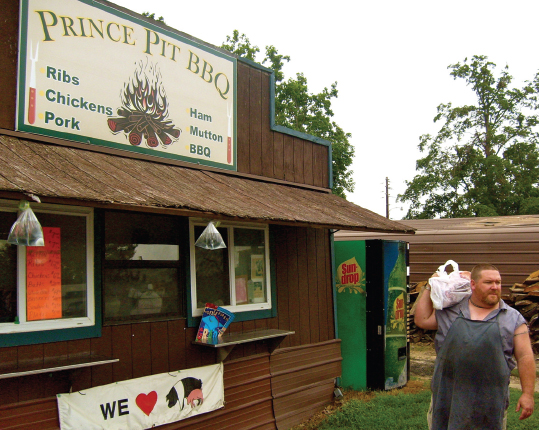
Ricky Prince receives a whole shoulder for custom cooking, Prince Pit BBQ, Bardwell.
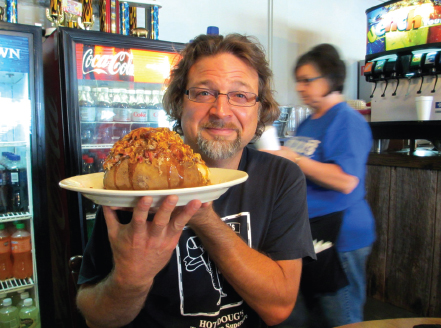
Wes Berry beholds the barbecue potato at Hardware Cafe, Cunningham. (Photo by Andrew Coiner)
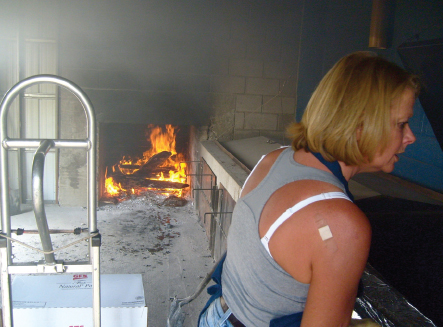
Lisa Powell, Red Grogan’s Bar-B-Q, Clinton

Valerie Minor, Deno’s BBQ, Fulton
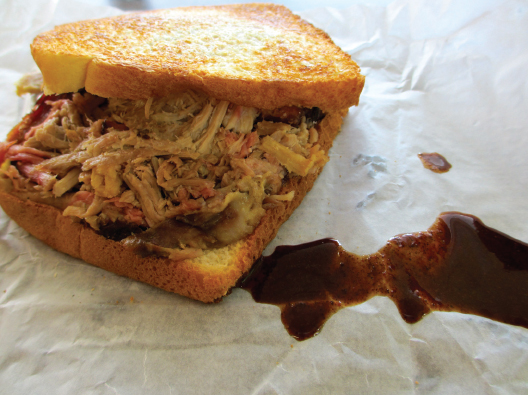
Pulled pork on toast, Harned’s Drive In, Paducah
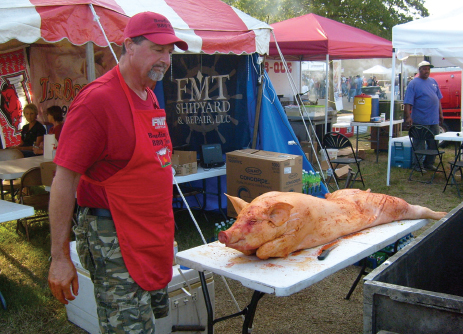
Boudin Man BBQ Team prepares whole hog at Barbecue on the River, Paducah.
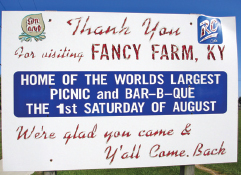
Sign near picnic grounds, Fancy Farm.

Wheeling shoulders to be chopped, weighed, and sold at the Fancy Farm picnic.

Protesting at the Fancy Farm picnic and barbecue.
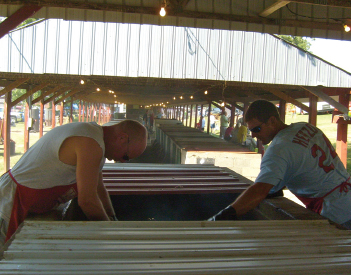
Taking pork shoulders off the pits at the Fancy Farm picnic.

Suzanne Flint, Carr’s Barn, Mayfield
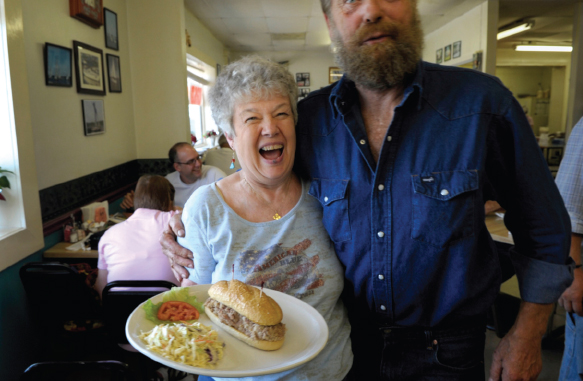
Jan Quarles delivers the magnificent hoggy sandwich at Mr. BBQ & More, Grand Rivers. (Photo by Jeanie Adams-Smith)
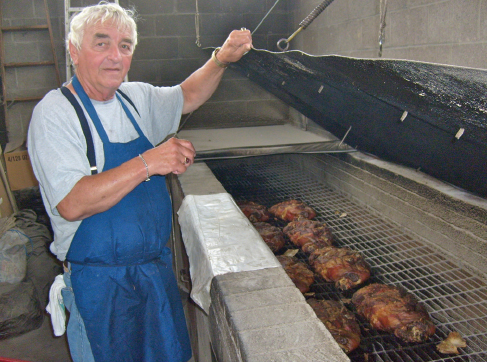
Cy Quarles and his long-smoked pork shoulders, Mr. BBQ and More, Grand Rivers

Michael Redd harvests pork shoulders at Heaton BBQ, Princeton.
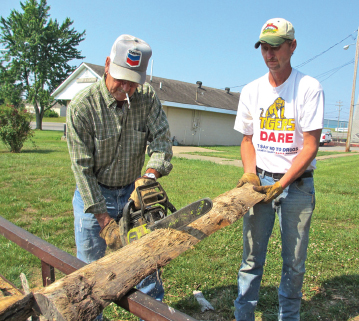
Kenneth and Lowell Jewell saw hickory slabs at Jewell’s Open Pit, Princeton.
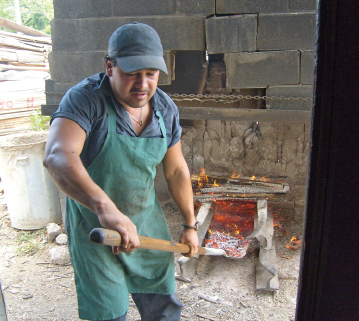
Chris Espino, Knoth’s Bar-B-Que, Grand Rivers.

Hickory slabs burning to coals, Jewell’s Open Pit, Princeton
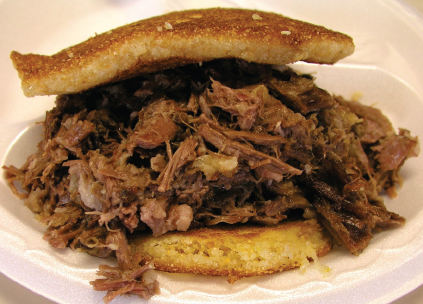
Chopped mutton with cornbread, Bar B Que Shack, Hopkinsville
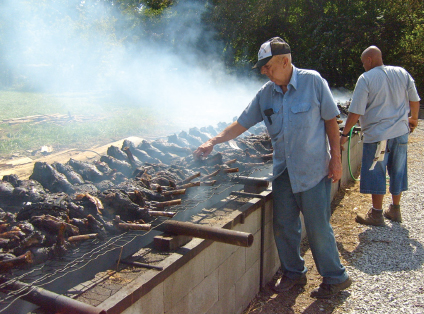
Mutton on the pits, St. Agnes Catholic Church picnic, Uniontown
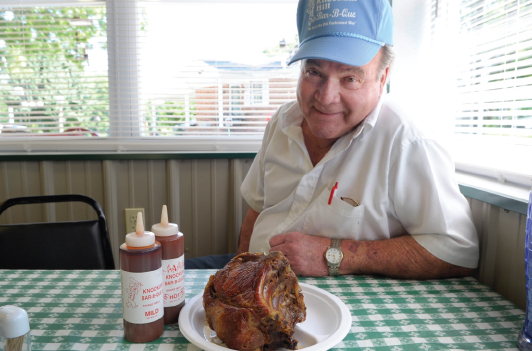
Oscar Hill and the “Big Chop,” Knockum Hill Bar-B-Q, Herndon (Photo by Jeanie Adams-Smith)
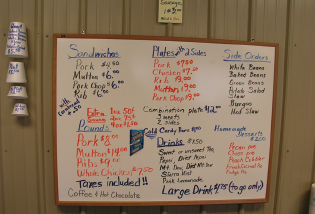
Bar B Que Shack, Hopkinsville
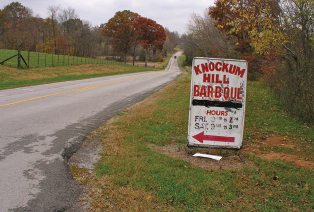
Highway 107 south of Herndon, early November

Slicing mutton at St. Agnes Catholic Church picnic, Uniontown
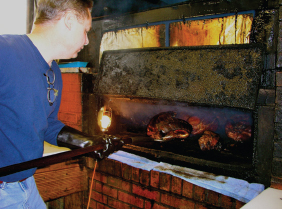
Frank Gibson, Thomason’s Barbecue, Henderson.

Blessed Mother Catholic Church’s Cooking Team stirs burgoo at the International Barbecue Festival, Owensboro.
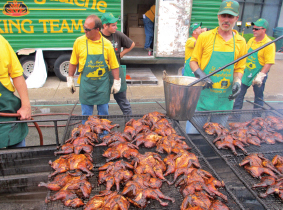
St. Mary Magdalene Catholic Church’s Cooking Team at the International Barbecue Festival, Owensboro.

John Klein and Barry Burton, J & B Barbecue, Henderson.
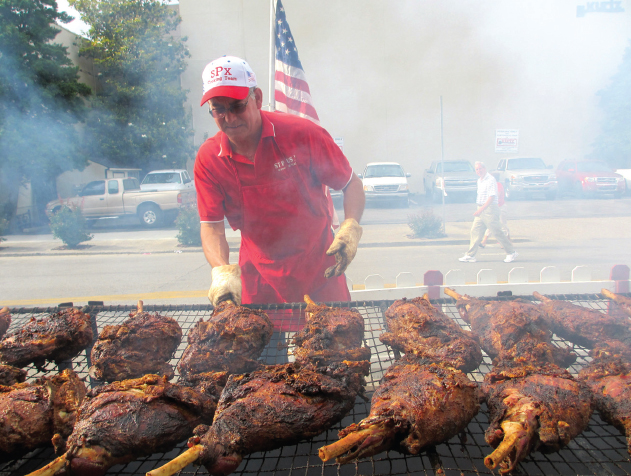
Saint Pius X Catholic Church’s Cooking Team member flips mutton quarters at the International Barbecue Festival, Owensboro.

St. Louis–style pork ribs, sliced mutton, beef brisket, burgoo, and sides at Old Hickory Bar-B-Q, Owensboro
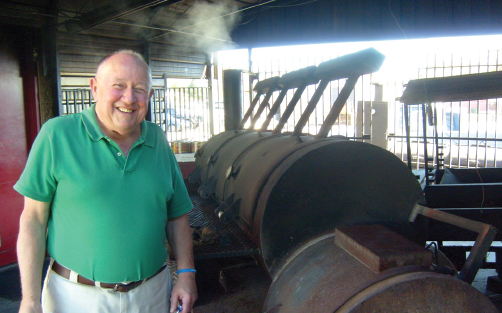
Jimmy Diemer, Jimmy D’s Real Pitt Bar-B-Que, Bowling Green

Gary Sandefur skewers a mutton quarter at Old Hickory Bar-B-Q, Owensboro.

Big Bubba Buck’s Belly Bustin BBQ Bliss, Munfordville.
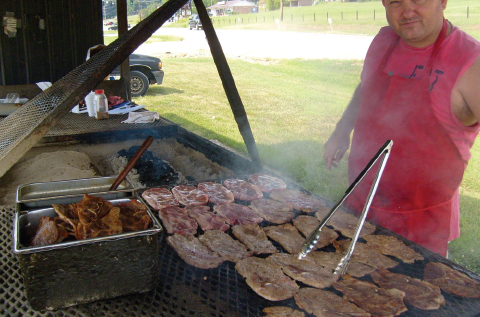
Grilling shoulder at South-Fork Grill, Glasgow.
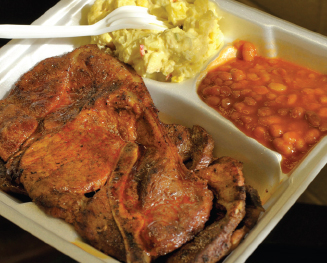
Shoulder plate “dipped,” Backyard BBQ, Tompkinsville (Photo by Jeanie Adams-Smith)
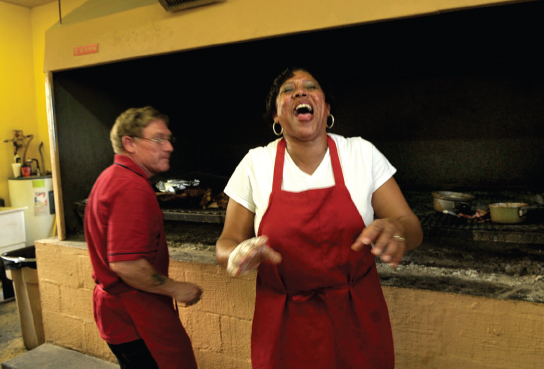
Anita Hamilton, R & S Bar-B-Q, Tompkinsville (Photo by Jeanie Adams-Smith)
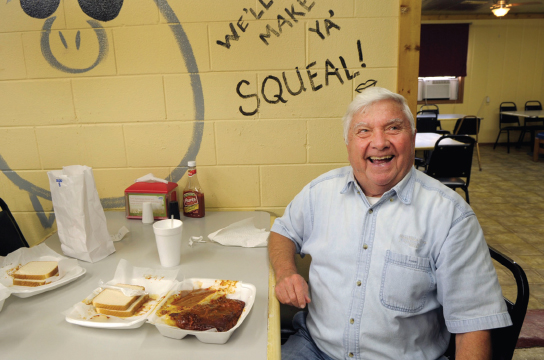
Frances’ Bar-B-Que, Tompkinsville (Photo by Jeanie Adams-Smith)

David Arms, owner of Frances’ Bar-B-Que, “dips and flips” sliced ham. (Photo by Jeanie Adams-Smith)
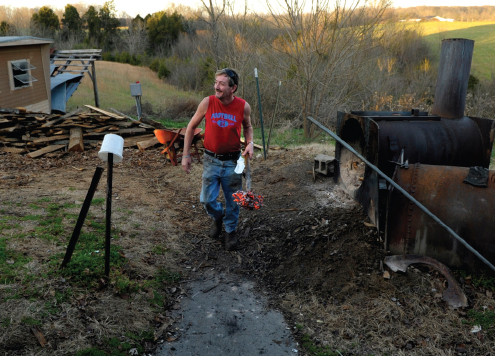
Wormie carries coals, Collins Barbecue, Gamaliel (Photos by Jeanie Adams-Smith)

Sliced shoulder on the pit, Collins Barbecue, Gamaliel
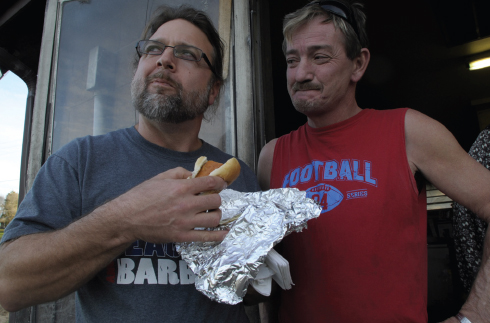
Wormie watches Wes Berry sample his quarter-pound “double dipped” hot dog to see if Berry can handle the heat, Collins Barbecue, Gamaliel.

Pat and Norman, Hamilton’s Bar-B-Q, Burkesville

Beef brisket, mac and cheese, and green beans, Doc Crow’s, Louisville

Rite Way Bar-B-Cue, Louisville

PBLT (smoked pork belly, lettuce, and tomato) sandwich, Hammerheads, Louisville.
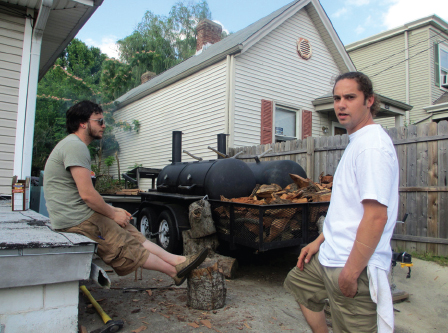
Chefs Adam Burress and Chase Mucerino, Hammerheads, Louisville.
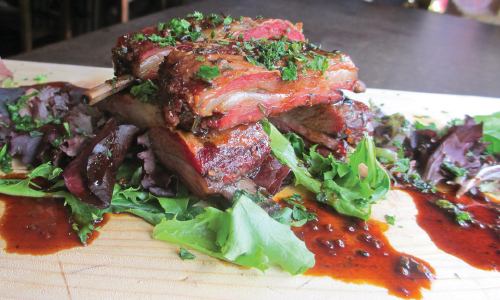
BBQ lamb ribs, Hammerheads, Louisville

Pitmaster Richard Tucker, Ole Hickory Pit, Louisville
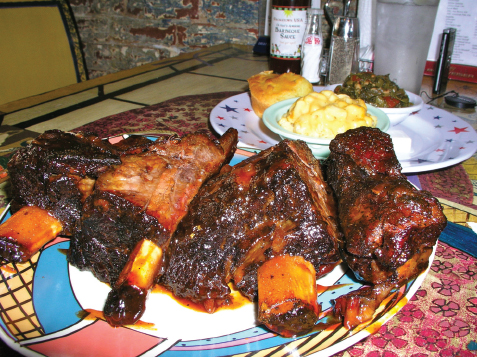
Flintstones (beef) ribs, mac and cheese, soul greens, and cornbread, Smoketown USA, Louisville

Roy Scott stokes his custom dumpster smoker at Scotty’s Ribs and More, Louisville

Beef briskets, Boston butts, and photojournalist Dominik Fuhrmann at Texican’s BBQ Pitt, Crestwood
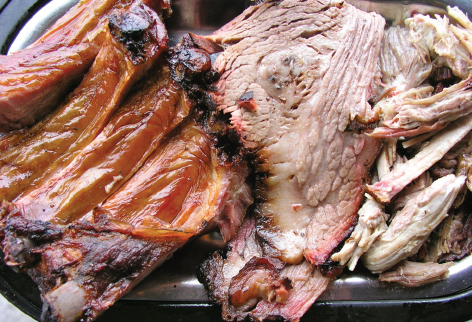
Pork ribs, beef brisket, and pulled pork, Sarah’s Corner Cafe BBQ, Lexington

Christian Clark, Pit Stop BBQ, East Point
If you’ve got a sweet tooth, save some belly room for Jimmy’s banana or chocolate pudding. It’s real good!
“This is my retirement,” Jimmy said. “This is fun. I love it. It’s work, don’t misunderstand me. But it’s sort of a passion, and it’s really grown.” He said he plans to barbecue “as long as the good Lord will let me.”
I’d like to think the good Lord favors Jimmy’s good-natured generous spirit and will grant him—and his loyal customers—many more years of barbecue pleasures.
Open: Tuesday–Saturday, 10:00 a.m.–6:00 p.m.
5449 Scottsville Road; 270-781-2234
On a sultry late morning in early July, I rode passenger in the car of Shane Wood, one of my students who’d shown a great enthusiasm for barbecue when I confessed to a class of students how I’d spent my summer vacation traveling Kentucky in search of the best smoked meats. Shane approaches life with eyes open wide. He was about to work on a dude ranch in Colorado, and he wanted to fill his belly with some good barbecue before heading off.
We left the traffic jam that’s Scottsville Road and headed south of Bowling Green, and not far past the I-65 interchange the landscape shifts from concrete to greenery and you can breathe again. The humidity hovered over the treetops and cornfields as we drove the four-lane divided highway to our lunch at Split Tree Barbecue.
When I was a college student at Western Kentucky University in Bowling Green in the late 1980s, I used to pass Split Tree regularly on the way to visit friends in Tennessee. Back then Highway 231 was a two-lane road that wrapped and slithered over the knobs, and Split Tree was a small barbecue shack sitting by the road. When the state claimed the land for the road expansion, Jerome Wilson, proprietor, rebuilt in a grander style reminiscent of a hunting lodge. Animal parts, like the head of a wild boar, hang on the wood-paneled walls, and sturdy wooden-topped picnic tables fill two dining rooms with plenty of space in between, reminding me of German beer halls—groups of people sitting six to eight to a table with line after line of tables in an open space, creating a sense of community. When my brother Drew graduated from college, we had a family lunch at Split Tree after the ceremony, and I liked how the picnic table seating encouraged talking among tables.
Jerome Wilson opened Split Tree in 1981. He ran the original Split Tree shack for twenty years until the new road forced him to relocate. He learned to cook at an early age because he came from a family who shared cooking duties at home. His dad taught agriculture classes, and his mom worked in a factory, and every afternoon his mother came home from work and they hand-milked cows. Jerome and his siblings had to milk, too. But then his sister, who now works with him at the restaurant, “complained about having to fix the supper meal every night while mom was at the barn.” Their mother listened to this complaining for a while, and then she devised a new system and sent Jerome’s sister to the barn to milk cows and sent Jerome to the kitchen to cook supper. They had a three-week rotation of work duties. “We could all cook,” Jerome said. “Whatever was in the freezer, it was open season.”
Earlier in life, Jerome traveled the country a lot working construction and tried different barbecue styles. He learned the delicate art of smoking while working construction in Alaska. “An old feller up there taught me how to make squaw candy.”
“Squaw candy?”
“It’s made out of salmon. You smoke it for fifteen days, cold smoke, and you just keep enough smoke in there to keep the flies off. We converted an old outhouse into a smoker.”
The old man also taught Jerome how to make a perfect brine using a sixteen-penny nail stuck into a potato. You add enough salt and stir it, and when the potato floats you put the fish in the brine and let it soak for three days, and then you hang the fish and cold-smoke it. The smoke pit was buried in the ground about fifteen feet away from the outhouse, and they ran a pipe from the pit to the outhouse, and by the time the smoke reached the outhouse it was “cold.” They took shifts keeping the smoke rolling. The old man, who grew up in Sand Point, Alaska, said that if you didn’t take the mother of the girl you wanted to court some squaw candy, then you didn’t get a date.
Jerome designed his barbecue pit at Split Tree based on his Alaska salmon-smoking experience, although “Mine runs a lot hotter.” He smokes Boston butts for eighteen hours. He loads the masonry pits at night and cooks every day. The fire gets up to 300° at night when he fires up the pits, and then it dies down through the night, but there are always coals in the pit. The masonry pit is so thick it never cools down totally.
I reminded Jerome that over twenty years ago I stopped by his shack and ordered a shoulder plate—thin-sliced shoulder in the “Monroe County” style cooked over hickory and dipped in vinegar-pepper sauce that I grew up eating—my primary idea of barbecue at the time—and he’d said curtly, “We don’t do that.” When I told this story now, Jerome grinned and said, “Every section of Kentucky it’s cooked a little different. You get over around Tompkinsville and it’s nothing but shoulder, and I personally don’t consider that barbecue. That’s grilling. Barbecue is slow, and you add a lot of flavor by using nothing but green hickory wood.” He gets plenty of hickory from local loggers and uses about one and a half ricks weekly. He cooks only with wood, and cooks only spareribs, Boston butts, and whole chickens. “Boston butts are the best cut of meat, bar none,” Jerome said. “It’s just the right size, doesn’t have any bone in it, and the flavor is better than ham or tenderloin.”
This stripped-down approach to barbecuing yields some fine results, especially the barbecued chicken, which is seasoned with nothing but smoke. I normally avoid chicken at barbecue places, but I was tempted to taste this bird since it was one of only three meats on the menu. Shane and I made ourselves at home at one of those large picnic tables in the big open eating area off the main room where you place your order at the counter, and we shared a rib plate, chopped pork on hoecakes, and a half chicken. The side dishes at Split Tree are simplified like the meat menu: baked beans, slaw, and potato salad. They also offer Golden Flake chips and fat whole dill pickles (contained in a jar on the counter). We chose to wash down our lunches with Styrofoam cups filled with crushed ice and delicious sweet tea.
Shane and I both loved the chicken. The skin during the five to six hours’ smoking turned golden brown, and the flavor of that smoky skin, combined with the lush tenderness of the flesh, made us grunt and ooh and ahh and smack our lips with pleasure. Jerome smokes the birds whole and then cuts them after, so with a half chicken you get both white and dark meat—a drumstick, half breast, and wing. I went for the wing first to increase the crispy skin (read: tasty fat) to meat ratio, before Shane could get his greedy hands on it. Just kidding, Shane. You are a courteous, well-mannered young man. Ole Doc Berry was the greedy one at this table.
The spareribs had a deep smoky color and came steaming hot on the plate. Their smoke flavor was great, and the ribs in the meatier/fattier center part were tender, but the thin end pieces were tough and chewy. Because of this, the ribs weren’t my favorite. But that just might be because these ribs were thinner than others. The chopped pork on hoecakes was also good, with chunks of well-cooked pork—about a cup of it—piled on a thin hoecake and drizzled with sauce, topped with another hoecake, best eaten in pieces with fingers (instead of trying to eat as a sandwich). The Split Tree “house special” is this same concoction smothered in their pork-infused barbecue beans. I reckon you might have to use a fork for that dish.
Split Tree has a one-size-fits-all sauce, a tangy and sweet tomato-based sauce with a considerable vinegar tang, reminding me of Memphis sauces. Jerome, who prepared each meal ordered, drizzled a modest amount of sauce on the chicken, ribs, and chopped pork. Plastic bottles of the sauce sit on the table if you want more. Jerome’s sister, who took my order, said she made up gallons of sauce weekly. I also watched her flipping hoecakes on a flat iron behind the ordering counter.
At the end of our interview, I asked Mr. Wilson if I could see the custom salmon-smoking-inspired barbecue pits he’d designed, and he smiled and said, “Naw, I ain’t gonna let that happen.” Perhaps he thought I might steal his secrets.
Shifting gears away from the pit talk, Jerome told me that over twenty years ago Charles Kuralt, the traveling foodie, did a Thanksgiving special and chose Split Tree as one of the thirteen best places in the country to eat at.
And you should eat there, too, and when you do, give that chicken a try. A half bird set me back a reasonable $3.95 in the summer of 2011.
Open: Monday–Saturday, 10:00 a.m.–9:00 p.m.; Sunday, 11:00 a.m.–9:00 p.m.
115 Wilson Road; 270-842-2268
Here’s yet another reason why I’ve decided to feature barbecue places that have been open for only a short time. Ron Keen, who along with his wife, Sue, runs this small barbecue shack three miles west of Scottsville, serves up some of the best deeply smoked ribs I’ve ever had, and his pork pulled from butts smoked low and slow over hickory is hands down some of the best you’ll eat in south-central Kentucky.
I visited during a blistering one-hundred-degree-plus Saturday noon on Labor Day weekend. I’d just filled my little Ford Ranger with eleven hundred pounds of pig and chicken feed from Hoover’s feed mill nearby on Shores Road off Highway 585, where a big community of Amish folks lives, and the Ranger was sagging as I pulled up the hill into the gravel parking lot of Hickory Hill. Most people with sense were getting their barbecue to go and eating it in an air-conditioned room somewhere, but I ordered a quarter rib plate with barbecue beans and potato salad, plus an “island BBQ” sandwich, and carried these treasures over to one of three picnic tables shaded by big umbrellas arranged in front of the small trailer that serves as the kitchen.
I just had to try the island BBQ, because I had read on Ron’s website (which he developed himself) that he actually puts a slice of pineapple on this pulled-pork sandwich, along with a special sauce. Hard to pass up something as quirky as that in south-central Kentucky. I was reminded of Big Kahuna Bar-B-Q in Leitchfield and owner Frank Hewes’s Polynesian-influenced beef and sauces, and felt it oddly coincidental that two barbecue upstarts in this region tinkered with flavors of the tropics, using fruits like mango in sauces, adding pineapple, and so forth.
I sat at that picnic table, the dry heat blazing down, and popped the top of the Styrofoam box of the rib plate. Inside, hallelujah! Three bones of thick meaty ribs, dark bark on the outside, glazed with a medium-thick hot sauce of a color leaning toward red wine and studded with red pepper flakes. I had requested the hot, but they also offer a mild, a sweet, and a hickory bourbon sauce that’s not on the menu (I found out about this later when I talked with Ron after eating the ribs and sandwich and finding them wonderful). The ribs were super smoky. Ron smokes only with hickory, and whatever he does to his “voodoo” ribs, well, let’s just say the clichéd thing—it’s magic. The meat of these thick ribs was flavored throughout—not just on the surface—and that smoky pungency was just what I want in a rib. It might be too much for some folks, but I knew when biting into them that I was eating a rib cooked over real wood and tenderized by time and slow cooking. The meat clung to the bone and had some chewability. Barbecue is finger food, so when pulling a rib bone away from the quarter slab (Ron sliced them partly through to aid the pulling but didn’t separate them totally, which made for a pretty presentation), I got sauce all over my fingers and palms. Fortunately, there was a wet nap included with the plastic fork and napkin packet that came with the meal.
The pork sandwich was one of the strangest concoctions I’ve had in my barbecue travels, but it was real good: a heap of very smoky pulled and chopped pork on a regular white-bread bun topped with an ample but not overwhelming amount of a sweet and tangy yellow sauce tasting of pureed fruit and crowned by a heated ring of pineapple. The sandwich was sweet, and the deliciousness of the pork showed through. The pineapple complemented the smokiness of the pork. It was a lot of sandwich—a big heavy hunk in my hand.
When I ordered, I said, regarding the island BBQ sandwich, “I’m fond of bark, so if you want to work some of that in there when he pulls it, that’d be good.” I was noting the lack of bark on the sandwich when I spied an extra Styrofoam container setting off to the side, and I said, “Oh, that must be sauce.” I opened it up and found a nice little prize—barky pork pulled from the exterior of the butts. When I ordered and said I liked bark, I expected it on the sandwich, but I was really glad to get it this way, unadulterated by sauce, because that pork was as tender and smoky as any I’ve eaten. I savored these tasty morsels and said, “Oooh, Lord,” and licked grease from my fingers. Really, it tasted much like what I prefer when I smoke up butts at my home—an intense hickory smoke flavor with seasonings throughout the meat (I often use injections of apple juice and other spices), tender and moist. The scoop of potato salad was also good, with a flavor more sour (from chopped dill pickles) than sweet, and the BBQ beans were pork and beans pepped up with barbecue sauce and shreds of smoked pork. In addition to the pulled pork and ribs, you can get (if the cholesterol police are on your trail) pulled smoked chicken or a barbecued chicken breast.
A hot breeze blew across the property and flapped the American flags hanging from the barbecue trailer. People pulled into the gravel parking lot and walked up to the ordering window. A couple on a Harley blasted down the highway, the woman’s headband flapping behind her. One man ate a pork sandwich on the covered porch of the trailer because he didn’t want to get sauce inside his new car; his wife waited in the air-conditioned car. Country music played out of speakers mounted high on the trailer.
While I was eating the island BBQ sandwich, Ron came out of his trailer and asked me, “Everything okay?” and I said, “Yeah, everything’s great. Can I talk to you a second?”
That second turned into a half hour. We talked barbecue. Ron admitted that the ribs weren’t baby back (what’s listed on the menu) because his supplier from Nashville didn’t have any, so he cooked spareribs instead. But the spareribs had been cut short so they could have fooled someone into believing they were baby backs. I actually thought they might have been the “extra meat” baby backs available these days.
Ron has cooked for family and friends all his life. In 2008 he semi-retired from his day job and decided with his wife, Sue, that they’d try serving to the public. They have a good location, being so close to the big Amish community, which sees a lot of traffic passing by, especially during the produce season of summer. He’s developed a following of repeat customers from as far away as Nashville and Louisville and has even shipped barbecue to Memphis. “People come back and I recognize ’em, and I say, ‘Are you back visiting the Amish?’ and they said they came back to get barbecue.” He said his work is a “labor of love.”
I asked Ron how he got the idea for the island sandwich, and he said, “Well, I love the islands. I used to vacation near Hilton Head and Savannah. It’s kind of the pork and pineapple thing that you’d see at a luau sometimes, that type thing. I tell people I can’t get ’em on the beach, but I get ’em as close to it as I can.”
A buggy driven by a young Amish woman passed out on Highway 100, and the clip clop of horseshoes pounding the pavement mixed in with the country music. I told Ron I got my produce from the local Brubaker family and my pig and chicken feed from Hoover’s feed mill over on Shores Road, and he said the Amish folks stop by all the time to get the pork. Earlier, talking with the young man at the feed mill (who muscled hundred-pound sacks of feed into my pickup like nobody’s business), I asked if he’d eaten the barbecue at Hickory Hill, and he said, “Yeah, I like it, but my little brother can’t handle the spice in the dressing they put on it.” I smiled at that—never heard of barbecue sauce called dressing before.
I asked Ron how business had been with the slow economy, and he said, “It’s been great. A lot of times this parking lot is full and the field is full. You can’t move.” Hickory Hill is in the country, and Ron said that when people ate out there in the spring when everything was lush and green after all the rains, they said, “This looks like being in the Smoky Mountains somewhere.”
Ron had to go tend his smokers, so I thanked him for his good work and looked around at the beauty of the place—the big dry field stretching out to a treed horizon—and watched the smoke billowing from the stack of an iron cooker out back. And I called it good.
Hickory Hill is open only two days per week, seasonally. The Keens are operating on the premise that if you starve people of barbecue for five days per week, then they’ll come running when it’s available. It looks to be working for them.
Open: Friday–Saturday, 10:00 a.m.–6:00 p.m. (closes for winter in October or November—call ahead)
2791 Franklin Road (west of Scottsville on Highway 100); 270-622-0508
Hickory Hill Barbecue’s Kentucky Bourbon Barbecue Sauce
I asked Ron Keen to share a recipe with us, perhaps his far-out “island” barbecue sauce, and here’s his response: “I think I choose not to disclose my island sauce recipe, as it is quite an exclusive for us. However, I will submit for your use my recipe for our Kentucky bourbon barbecue sauce. Our baby back ribs with Kentucky bourbon sauce have gained a reputation I’m proud of!” Thank you, Ron and Sue Keen.
¾ cup of your favorite Kentucky bourbon
½ onion, minced
4 cloves garlic, minced
 cup apple cider vinegar
cup apple cider vinegar
 cup red wine vinegar
cup red wine vinegar
2 cups ketchup
¼ cup tomato paste
½ cup brown sugar
½ teaspoon ground black pepper
½ teaspoon salt
2 tablespoons liquid smoke
¼ cup Worcestershire sauce
 teaspoon hot pepper sauce
teaspoon hot pepper sauce
 teaspoon ground cayenne pepper
teaspoon ground cayenne pepper
2 teaspoons vegetable oil
Heat vegetable oil in a skillet over medium heat. Add the onion, garlic, and bourbon. Simmer for 10 minutes or until onion is translucent. Mix in the remaining ingredients and bring to a boil. Reduce heat to medium low and simmer for about 20 minutes. Run through a strainer and enjoy!
If you want good barbecue in Scottsville, unbuckle your kilt (you’ll need the extra space at the waistline) and visit this true takeout shack, where you can smack your lips on the best hickory-cooked chicken and sliced pork shoulder within the city limits of Scottsville. They also serve shredded pork from Boston butts, pork spareribs, pork tenderloin, and hickory-grilled hamburgers and hotdogs.
My anticipation was high as I pulled in at 10:50 on a Thursday morning and saw smoke billowing out the back of the small, brick, ranch-style building, which looks like a converted duplex, next door to the Redemption Worship Center. Across the road stretched an open field full of rolled hay and a line of mature trees. I sneaked a peak out back and saw a huge pile of split hickory and several dozen huge bundles of hickory boards and a dumpster-sized firebox for firing this wood down to coals. The wood and smoke—and probably the fact that I’d eaten only a small bowl of granola for breakfast— stirred my stomach.
I walked inside a small air-conditioned room furnished with a small table and three chairs, another table with two chairs, a standup cooler stocked with Coca-Cola products, and a counter for ordering. The menu hangs on the wall. Cinderblock walls are painted white. The shack was sparsely decorated except for a calendar photo of the Scottsville Police Department, a rack of Lay’s potato chips, and Smoke Shack T-shirts (for sale). A young woman asked me what I wanted, and I said I needed a little time. Only one other customer stood at the counter. I stood back and pondered the choices, and then a bell went off and the door opened and four men wearing yellow safety vests, like from a road construction job, walked in, followed by a big man in overalls.
I’d missed my chance for quick ordering, so I took a chair and looked over the menu, and the door chime kept dinging as more and more men filed into the place and stood in line to order. The men all talked in the thick Allen County drawl, and their orders sounded something like this: “Give me a half chicken plate sprinkled,” or “I want a shoulder plate dipped.” In the local lingo—and you find the same thing next door in Monroe County, where the owners are from—“sprinkled” means that your meat will be drizzled with a vinegar-pepper sauce, “dipped” means they dunk or ladle sauce over your meat, for a hotter peppery flavor. I noted that most of these men ordered shoulder plates and chicken plates. That should have told me something. Pay attention to the locals.
Finally the swarm of men left and I was able to order. The menu says that ribs aren’t ready until 11:00 a.m., and since it was right then 11:00, and because I’m a sucker for ribs, I ordered a rib plate with vinegar slaw and potato salad—despite my hearing the locals ordering chicken and shoulder. The rib plate set me back $7.50, very reasonable. I sat at the unoccupied table in front of the ordering counter, by a window looking out onto the blacktop driveway. From the window you can see the Dairy Queen and the U.S. Bank up on Highway 100. Smoke Shack sits down an incline from the highway. I imagine that many folks driving by on that busy highway are beckoned down the hill by that beautiful smoke rolling out the back.
You can get all the meats—even the ribs—as a sandwich or a plate. A sandwich just comes with two slices of white bread. A plate comes with a choice of two of the following barbecue standards: baked beans, vinegar slaw, mayo slaw, or potato salad. I opened the Styrofoam lid and discovered a steaming hunk of spareribs covered with a piece of aluminum foil (apparently to keep the white bread from getting wet). About bread: I don’t eat white bread often—certainly not if I have to save belly space for food much better than white bread—and I noticed that you can get two hoecakes added to your order for a mere 25¢. The hoecakes looked good. If I wanted bread, I’d go that way. They smoke Boston butts for eight hours for their shredded pork sandwich, which you can get on a bun or cornbread.
The ribs were darkened nicely by the smoke. I lifted a bone and it pulled right out, telling me that the ribs were probably wrapped in foil. But the flavor was really good—the smoky rich taste of pork rib mixed with a tomato paste-like sauce. The helping was a generous five bones plus a hunk of flap meat (if you’ve cooked spareribs at home, you know what I’m talking about). The flap meat was tasty but tough. I liked the ribs. The texture was too soft for my liking, but the meat tasted rich, salty, and smoky. I licked the sauce from my fingers and was happy. As for sides, the potato salad was creamy with chunks of potato and the distinctive sour flavor of pickle juice, and the vinegar slaw was finely chopped crispy cabbage and carrots, appropriately tangy.
After the satisfaction of the rib plate, I tried the shoulder, tenderloin, and half chicken, and then I understood why the local men were ordering so much chicken and shoulder. The half chicken worked like a sponge to soak up the hickory smoke and vinegary pepper sop that Cliff Smith, the pit master, mops on during three hours of cooking over hickory coals. Cliff also sprinkles a seasoning salt onto the chicken from a shaker jar, which works well with the smoke and vinegar. The result is truly outstanding smoked chicken. The slices of shoulder are just what I want from Monroe County–style barbecue: thinly sliced ovals of pork with a band of fat ringing the leaner meat, cooked over hickory to the point of being tender but not dry, and the flesh takes on a darker hue. I like it dipped with sauce on the side. Smoke Shack’s sauce tingles on the lips; I know because it’s tingling mine right now, as I brought some home with me for additional “research.” I love my hobby.
As for the pork tenderloin, I have mixed feelings about it. First, I think tenderloin isn’t the best meat for barbecue, as it’s too lean, and this shows, because the pretty strips of white tenderloin meat were dry, especially when not wetted with dip sauce. But—and this surprised me—some pieces of the tenderloin were darker than others, like getting both white and dark meat on a chicken, and like a chicken’s fattier thigh and leg meat, there were pieces of darker meat in the tenderloin that were moister. These darker pieces soaked up more of the vinegar sauce and raised my assessment of it, but you have to love the vinegar sauce to enjoy a piece of meat soaking in it. I wouldn’t want well-smoked meat smothered in a thick tomato sauce, but I’m more tolerant of a liberal dousing of vinegar sauce, at least when the meat is smoked sliced shoulder in the Monroe County style and the less fatty tenderloin.
Back at the grill, Cliff flipped pieces of shoulder and big three-quarter-pound hamburgers and drizzled them with vinegar sop. The meat cooks about one foot off the smoldering hot coals that Cliff brings in from outside with a shovel. Cliff said that shoulder is the biggest seller. He’d been tending the meats for five years in 2011—but apprenticed a lot longer than that—and Smoke Shack has been open since 1995.
It’s a family business that first started in Gamaliel in Monroe County under the name of Uncle Bo’s. They operated there for five years before moving to their current location because there was a desperate lack of barbecue in Allen County. Now they are the only deal in town, which seems good for business, judging by the healthy customer flow on this Thursday lunch hour.
Cliff said they used to be even busier before several factories left town for cheaper labor in Mexico. They used to have a G.E. plant and a Sumitomo factory, but both closed their Scottsville operations. Still, the place seemed well patronized, and Misty Dodson, who took my order and has worked at Smoke Shack for thirteen years, confirmed that, yes, business had been good on this sultry August Thursday. Misty was a real ambassador for the shoulder and chicken and vinegar sauce, and she said all their side dishes are homemade.
Side Dish: Allen County Amish Country
Smoke Shack BBQ is located just south of Scottsville, and if you continue west on Highway 100, which splits into Highway 585, you’ll find yourself in the thick of beautiful agricultural country where many Amish folks have settled. One August afternoon I drove to Hoover’s Feed Mill at 1013 Shores Road to buy feed for my two Duroc hogs, the roads twisting through some of the most beautiful land I’ve seen, and saw roadside wagons filled with watermelons and cantaloupes with signs posted on them—“2 cantaloupes for $1”; “Watermelons $1 each”—but nobody was around selling: it was the honor system. Mimosa trees lined both sides of the road, and I passed fields of corn and some tobacco patches, a rare sight in Kentucky these days. The country is populated with modest homes, with stacks of wood standing outside.
After getting my load of feed, I visited the Thomas Brubaker family down the road, who live a Little House on the Prairie life in the twenty-first century. I’ve subscribed to the Brubakers’ CSA (Community Supported Agriculture) for the past three years, writing them a check in early spring for the promise of organic fresh vegetables and some fruit weekly for twenty-eight weeks, and I just wanted to stop in and say howdy. The whole family was there, children all over the place. Thomas’s son packed me a box full of red and white potatoes, a big bag of fresh corn, and a gallon of goat’s milk. And then I drove on down the road, where I met a horse-drawn buggy. A teenage girl held the reins, and she was pulling a wagon filled with cantaloupes. I passed a small sign advertising “Shoe repair” hanging from a mailbox at the end of a gravel drive, and another saying “Harness shop.” Horse droppings lay in the road. It’s a peaceful country, as close to a bygone era as you’re likely to find in this fast-paced world. It makes for a real pleasurable Sunday drive. But if you want animal feed at Hoover’s Feed Mill or produce from the Amish folks, come Monday through Saturday, because they take resting on the Lord’s Day seriously.
Cliff has been working there since 1999, since he was fourteen years old. His sister and brother-in-law, Chasity and Matthew Wilson, are the owners. Misty is his brother-in-law’s cousin. And Cliff’s wife works the counter. Confused yet? I sure was. I said, “Sounds like a real family affair,” and Cliff said, “Most are family. A couple of girls who work here ain’t,” and Misty added, “We treat ’em like family though.”
By the time I left Smoke Shack, I felt like I’d been treated like family, too.
Open: Wednesday–Saturday, 10:00 a.m.–7:00 p.m.
100 Holt Drive; 270-237-5629
An eatery in a community named Pig that calls itself the Porky Pig Diner must have barbecue, right?
Well, yes, it does, but one kind only: pulled pork from Boston butts cooked seven to eight hours with indirect heat on a steel smoker beside the store. Calvin Durham, who along with his wife, Ramona, runs the diner, can smoke two hundred pounds (about twenty-four butts weighing eight pounds each) at a time. The smoker was cold when I visited, and I asked Calvin how often he fired it up. He said in the fall, maybe once per week; in the summer, two to three times per week. Fortunately, pork butts are a cut of meat that holds well after cooking; it’s pretty forgiving about reheating. Calvin uses hickory wood to smoke the butts for three and a half hours, then double wraps them in foil for another four hours of cooking. “You’re done smoking after three hours,” Calvin said. “It’s absorbed all it’s going to take.” Sometimes they use a little apple wood, sometimes wild cherry. “There’s a lot of hickory in Edmonson County,” Calvin said.
And the pulled-pork sandwich I ate (along with big, crispy, seasoned, beer-battered fries and baked beans) was good: big pieces of tender, smoky, salted meat layered on a bun lightly toasted on the inner sides. The sauce is— in Calvin’s words—“a sweet, zesty hickory-mesquite flavor.”
People travel all the way from Elizabethtown (about one hour north) to get the catfish at Porky Pig. “That’s my #1 seller,” Calvin said. “My barbecue is second in line.” Sometimes they run specials of other smoked meats, like smoked chicken and a two-inch-thick pork chop on Saturdays if the weather is good for outdoor smoking. There’s indoor smoking as well—of the tobacco kind. These rural eateries and markets resist the indoor smoke ban of cities.
The dining room is decorated with plentiful pig art, including a sparkling golden pig a Western Kentucky University professor just sent them back from a trip to China. The professor stops at the diner when taking students on field trips to Mammoth Cave—and has even given them extra credit for eating at Porky Pig. There’s a small gift shop off the main dining room.
I asked Calvin what got him into the restaurant business. “Stupidity,” he said, laughing. Actually, he had been driving a truck for years and in 1995 decided to open a place that “served food like I wanted to eat instead of what I’d been eating for the last twenty years [on the road]. So we went to serving home-style cooking.”
Calvin and Ramona have received some good press over the years. “We’ve probably had 2 million pictures took here from tourists,” he said, “and we had a newspaper out of Cincinnati here, and one from New York here, and we’re in two or three different books. One is called Passing Gas.” (That’s a cross-country photo book featuring towns with quirky place-names.) He added that Western Kentucky University has probably had a hundred students do projects on Pig. The university has one of the strongest photojournalism programs in the USA, and they send students out on shoots. Pig (both the community and the diner) offers the kind of rural Kentucky charm that can make good stuff for photos.
An endearing feature of the Pig diner is Pound Hound, a chunky basset hound that lounges on the porch. “He showed up at someone’s house down the road,” Calvin said, “then he wandered up here. So we took him back, and he came back, and we took him back again, and he came back, and one of the boys who comes in here took him home with him, and forty-five minutes later he was back. Timmy said, ‘Well, he’s not going to stay here [at his house] so leave him up there,’ and he’s been here ever since.” Pound Hound has good instincts. He gets well fed at the diner and also receives plenty of attention from customers.
You can get well fed there, too.
Open: Monday–Thursday, 6:00 a.m.–7:00 p.m.; Friday–Saturday, 6:00 a.m.–8:00 p.m.; Sunday, 7:00 a.m.–3:00 p.m.
125 Park Boundary Road; 270-597-2422
And the award for the best-named barbecue shack goes to . . .
This shack just east of I-65 cracks me up, blowing the Kitsch-O-Meter sky high. A hand-painted sign out front reads, “BBQ OPNE,” with the N painted backward. The sign leans against a rusted old farm tractor, above which flies Old Glory. Various smokers clutter the property, including a large one made from a natural-gas tank with bits of metal welded to it to make it look like a pig, with a snout (from a baked bean can) and a tail (a shock spring from a 1948 fire engine), eyes painted on, and eyelashes made from the tongs of a concrete rake.
Inside are some small folding tables with assorted nonmatching chairs. Two large American flags hang from one wall, and a cross hangs between them, along with the Ten Commandments mounted behind the ordering counter. Pig art lines a shelf high up on the wall and decorates the top of a refrigerator. A piggy clock keeps the time. A flat-screened television plays loudly. Blue carpet covers the floor, and pine paneling covers the ceiling. A sign says, “Sorry, this is not fast food. We cook to order. Thanks. Signed, Big Bubba.”
And yes, there’s that wonderfully alliterative name.
They sell T-shirts, pies, jellies, and butter. They’ve shipped barbecue sauce all the way to Puerto Rico and T-shirts to Australia. The menu includes ribs, pork sandwiches, sliced shoulder, fried pork chops, fried bologna, and a barbecue taco. Side dishes are extensive: potato salad, pinto beans, collard greens, fried corn, fried okra, fried green tomatoes, sweet potato fries, fried squash and zucchini.
I waited for my meal as Rocky Balboa fought Mr. T. on the television. Big Bubba’s has been written up in the Trucking Times, a newsletter for truck drivers. Being so close to I-65, a busy trucking route linking the North with the South, Bubba’s gets 95 percent of their business from truck drivers.
The chopped brisket sandwich came without sauce on a regular hamburger bun. The meat was tender with a lot of fat mixed in and good bark on the outside. The flavor was smoky and fatty—real good. The pork sandwich was sauced lightly, heaped on the bun. I wasn’t a big fan of the sandwich, as it wasn’t very smoky and had a sloppy joe flavor, and I’m just not into that. The richly flavored collard greens were salty, with meat cooked in, and the sweet “tater” fries were crunchy and sweet. I liked both side dishes a lot.
“We cook all year long,” Amanda (who goes by “Dixie Darling” on the CB radio), explained. “Blizzards, tornados, ice. We chiseled ice off the grill doors just to get in to cook.” Ribs are the #1 seller, followed by the sliced shoulder and shredded pork sandwich. I asked Amanda what she likes best, and she said, “The hickory-smoked Cornish hen.”
“That’s not on the menu,” I said.
“Naw, it’s a specialty. I like that and the beef brisket. And the banana pudding. If we don’t have banana pudding, they will not come in and eat.” Meaning the truckers.
Briskets smoke eighteen to twenty-four hours. Boston butts—she said, “I put them on this morning and they’ll be ready about this time tomorrow afternoon.” In other words, a long time. They cook everything on homemade smokers—that outdoor pig art fashioned from steel cylindrical tanks—keeping the heat going through the night with charcoal and adding slow-burning hickory for additional heat and smoke. The baby back ribs go right on the pit with no rubs or sauces. Just meat and hickory smoke. The ribs I tried were very tender and went well with their super-hot sauce. While the sweet potato fries come from a food-service company, the zucchini, green tomatoes, and corn come from their own garden.
When they first started, Robert “Bubba” Chapman had $200 in his pocket. He bought a case of Boston butts, and they set up for the annual Civil War Days. Locals loved it and asked for more. So they built a trailer and rented a lot near McDonald’s and sold out of the trailer for three years. They made enough money to move the trailer to the current location, and a year later they built the dining room on. Then they added bathrooms.
It’s a family business. Amanda is Bubba’s sister-in-law, having married “Little Bubba.” Additionally, there’s Bubba, his mom, his wife, and the babysitter—the original working crew. Their truck-driving customers are loyal. Amanda said, “If they know they are going on vacation or getting laid off, they’ll call and tell us, ‘Hey, I won’t be in next week,’ or ‘I won’t be in for two weeks,’ because we’re pretty much family, and if they don’t come in on their regular time then we don’t know what happened to them.”
In one such case, a regular trucking customer who came in often to get a catfish taco with hot barbecue sauce on it had a wreck near his home near Atlanta. The wreck shattered both of the man’s knees and broke his neck. The man’s wife got up in the truck looking for numbers for the trucking company so she could tell them what happened for insurance purposes, and the only number she could find in the truck was the one for Bubba’s. Well, she called. Bubba answered.
She said, “Who is this?”
“This is Robert Chapman. I own Big Bubba’s barbecue in Munfordville, Kentucky.”
“Well, my husband is a regular customer of yours. He gets the catfish taco. With the hot sauce.”
Amanda, telling this story, said, “Well, we knew exactly who she was talking about.”
The woman said, “My husband’s been in an accident and this is the only number I could find in his list of important numbers.”
So, the folks at Bubba’s went and bought a card, and they all signed it, and Bubba shipped the man a bottle of sweet and hot sauce, and the man’s wife bought a case of catfish and some taco shells so she could make him catfish tacos.
I love that story.
On a return trip to Big Bubba’s, I ordered ribs during a weekday lunch hour. This time they were spareribs instead of baby backs. I got them to go and ate them down by the Green River at a park in Munfordville. These ribs were a bit tough, as spareribs tend to be if not cooked long enough. And they didn’t have the super-hot sauce I tried (and loved) on my first visit. This gives me reason to return, to see if the chewy spareribs were a fluke.
Whatever the case, I recall fondly that initial meal I had at Bubba’s, and Amanda’s great storytelling, and the homemade side items, and the flavorful brisket and very good baby back ribs. We’ll just have to give them another try. You should, too. The place and people are pretty unforgettable.
Open: Monday–Friday, 10:00 a.m.–10:00 p.m.; Saturday–Sunday, 10:00 a.m.–8:00 p.m.
U.S. 31 West; 270-307-8309
The commercial district of Uno has seen better days. The few buildings that once held businesses now stand quietly closed, home to spiders, except for one wonderful exception—Gerald and Wanda Judd’s conversion of the old Uno general store into one of the best home-cooking little barbecue joints around, in business since March 10, 2010, and going strong.
My companion (now wife) Elisa and I arrived at Mama Lou’s at 1:00 p.m. on a Thursday. We were impressed by the number of vehicles parked up and down the highway. Across the road, a healthy field of August corn stretched to the horizon. The Clear Point Cumberland Presbyterian Church stands next door, and a weathered tin-roofed tobacco barn behind the store adds to its rural rusticity. I’m glad we arrived when we did, because we got the last of six tables, and then some other folks came in and had to wait for a table, and the front door kept donging as others walked in to get carryout orders, including a group of young Amish fellows who occupied a vacant table and played the triangular “I.Q.” game with the golf tees while they waited on their to-go food. An extensive mug collection (not for sale) lines the shelves along the walls. Some of the gifts for sale include handmade soaps and “goat milk products.” At a nearby table, a woman smoked a cheap cigarillo. I guess Uno doesn’t cotton to smoking bans like some larger fancier towns. Kentucky does rank near the top of the list of states in tobacco usage—and we use all kinds of it. Twist, plug, and shredded tobacco for chewing; various cuts of “dip,” smokeless tobacco for tucking into the lip; pulverized tobacco called “snuff” for snorting through the nostrils; and of course various smokeable forms. The high ceilings of Mama Lou’s, along with the air-conditioning and ceiling fans, helped filter the smoke.
Side Dish: Kentucky’s Curiously Spoken Place-names
I was eating at Mama Lou’s in Uno and talking with owner Gerald Judd when I asked him a question about the history of the little rural berg, pronouncing it OOO-no, and he smiled and answered my question by calling it YOU-no.
Kentucky offers a wonder of creative takes on the English language. We especially love twisting European names into our own Kentucky brand of English. I grew up near the rural community of Etoile in southern Barren County. Etoile is a French word meaning star, pronounced by the French as e-TWA (or something like that). Locals, of course, pronounce it EE-tull. I’ve heard some call it EE-toil, but that final syllable comes out more like ull than oil.
Speaking of which, my uncle Terry once had car trouble in New England. He walked into an auto parts store and asked for a kortuhvull as in “I need a kortuhvull.” The guy behind the counter just looked at him quizzically. Uncle T. tried again. No luck. He tried slowing down, saying, “Kort-uh-vull,” but the New Englander still didn’t get it. About that time, someone else walked up to the counter and ordered OY-yull, and my uncle caught on and asked for a kwart of oy-yull, thus completing the transaction.
No surprise, but Kentuckians refer to Versailles, the French-named town west of Lexington, as ver-SAILS. There’s a spot in the road in southern Grayson County named Moutardier. Locals call it MOODY-deer. In Hart County, there’s a place on Green River spelled Rio, as in Rio Grande. What do locals call it? RYE-o. Seriously.
I love these revisions of proper pronunciations. In all fairness, it’s the devilish French words that cause the most trouble. Sometimes Kentuckians do get it right, however. In Edmonson County you’ll find the community of Chalybeate. For the life of me, I figured people would call this place chally-beet, but they don’t. They pronounce it kuh-LIB-e-it, real close to the dictionary’s directions.
We ordered a brisket platter with slaw and baked beans and a rib platter with green beans and fried potatoes. The food was served on heavy-duty paper plates, along with real (not plastic) forks and knives. I’m glad we chose the cornbread, because the perfectly browned huge wheels—about the size of a Frisbee golf disc—were as sweet and good as I’ve ever had. The green beans were just like Mama makes—and I mean my own mama, Linda Berry, who can cook up country grub as good as anybody. These aren’t your health-conscious steamed skinny green beans but rather the broad kind stewed along with fatty pork until soft and rich. The fried potatoes were diced and peppered and cooked in oil until soft, reminding me of my grandmother’s version. The baked beans are cooked with country-style crumbled sausage and have a pleasant mustardy taste. Five bones of extra-meaty baby back ribs with a sweet tomato-based glaze rounded out the rib platter, and the brisket platter came with six thinly sliced strips of brisket, also moderately sauced.
The sauces here are less vinegary than what I’ve found in far-western Kentucky, but also thinner than I’ve had in Kansas City and Chicago. Elisa, who’d eaten brisket down at two famous places in Lockhart, Texas, several months before, said that Mama Lou’s brisket was exceptional. She even favored it over the brisket at Black’s, one of the Lockhart restaurants, noting that Mama Lou’s meat was moister. I also loved the brisket. It was smoky, tender, well seasoned, and juicy—just everything you expect from an exceptionally prepared brisket. The meat and fat pretty much melted in the mouth. A couple of the rib pieces—the very meaty outer portions—were on the dry side, but when I dug deeper into the fat closer to the bone, the meat was delectable. And some of the ribs were all-over tender, even the outer bark, which soaked up plenty of sweet hickory smoke. We loved all the side dishes and the brisket, and the ribs were also very good. There was nothing but bone left when we got done with them.
After eating we spoke with the Judds, who were sweet as can be. Wanda was our server, and she kept checking on us throughout the meal. She said they’d been serving five hundred to six hundred people weekly from Tuesday to Saturday, which is a lot for a small place that seats only twenty to thirty. They get Mammoth Cave traffic and have developed a following of local regulars who eat out on the deck on Friday and Saturday evenings when the weather is nice. One customer drives all the way from Mount Washington, up near Louisville, once each week to get hamburgers. I could see why when I saw the burgers being served nearby—real hand-shaped burgers smoked and served on Texas toast. The Papa Lou burger weighs in at twelve ounces, and a beautiful slice of red tomato was balanced on top of the one served at the adjacent table. They’ve had people driving up from Nashville and down from Bardstown and E-town (regional name for Elizabethtown). “We’re really happy and blessed,” Wanda said about their success during their first sixteen months of business.
The “daily special” is a one-pound potato loaded with sour cream, butter, shredded cheddar, real bacon bits (from thick-cut slab bacon they fry themselves), topped with six ounces of their pulled pork. It’s a big seller. “Everybody loves it around here,” Wanda said. “It’s a meal in itself,” Gerald added.
Wanda and Gerald put much thought into the menu when they opened in February 2010. “We’re out in the boonies,” Gerald said. “If you can’t get the biggest attraction you can—if you just come out here and sell barbecue alone—then you’re done. Because a lot of women don’t like barbecue. They want breast of chicken. I can’t sell salads simply because I don’t have space for refrigeration. So we at least tell everybody, “If you’re on a diet, you’re probably in the wrong restaurant.”
We all laughed at that one.
I said, “Thank goodness. And you can taste it in those green beans.”
“We chop our own ham. We even make our own bacon bits—we fry our own bacon. I buy thick-cut hickory smoked bacon and fry it up two or three pounds at a time and I chop it by hand.”
I complimented Gerald on the homemade sides, and he said, “Well, this area’s raised on beans and potatoes and cornbread. So when we designed our menu, I told Wanda, ‘We’re not gonna do the little hash brown squares, we’re gonna fix real live potatoes we peel and dice ourselves and fry ’em in a skillet like Mama did.’” He added, “In our beans we use fresh home-ground sausage; we don’t use store-bought sausage.”
I told him I loved the cornbread, and he said they’d gone through six pounds of cornmeal already that day. I said, “That was a healthy round of cornbread,” and Gerald responded, “Well that’s another thing—our philosophy here is that when you leave we want you to feel like you got your money’s worth. If you still hungry, you tell us and we’ll put some more on your plate. We have good food and we have service. If we don’t stay on top of those two games out in the boonies, we’re done.”
At the end of our meal, Mrs. Judd asked if we wanted dessert—a slice of pecan or peanut butter pie, perhaps?—and Elisa and I just laughed and said, “Are you kidding?” We were stuffed to the gills with the big portions of meats and sides. Wanda joked that there’s some dessert called a holy cow cake that she’s thinking about revising into a holy pig cake. I thought about the pig-smoking Catholics of western Kentucky—about the long-smoked pork and mutton they serve up at their church fund-raisers—and thought Mrs. Judd was right on track with that name.
Gerald said they want people to come to their place and lay back. “Our employees sometimes just sit around in the dining room with customers,” he said. “Life is extremely stressful. People need forty-five minutes off ever once in a while. So we want ’em to come out here and sit around and laugh and cackle and just have a big ole time. And we do. We look out here at one guy he might be sitting here one minute and over there the next, trading tables and seeing old friends. We got lawyers, executives, country folk, housewives, kids—you name it, they come here. And that’s exactly what we wanted.”
“We cook all our meats daily,” Gerald said. “We don’t freeze meat. We just don’t take any short cuts at all. I got it ingrained in all my girls in the kitchen. We don’t take short cuts. Period. Don’t even let the thought cross your mind—if it does, go to the bathroom and smack yourself.”
In addition to pulled pork, ribs, and brisket, you can get sliced shoulder cut three-eighths of an inch thick. “We sell a ton of shoulder,” Gerald said. “I sell a couple of hundred pounds a week.” You get two to three slices of shoulder on a plate, depending on the size. “I make a vinegar-based sauce just for the shoulder. They call it a Monroe sauce. I’ve got a variation of it, my own recipe.”
Gerald won the best barbecue chicken award in 2010 at the Hart County fair. He’s been selling chicken halves on Friday nights as a special. He’s now thinking about smoking whole prime ribs for three hours and then cutting them and grilling the rib eye steaks. When we left that day at 2:30, Gerald was putting Boston butts on his big steel smoker for the next day’s lunch.
Mama Lou’s is right off Highway 31 East, due east of Horse Cave (my birthplace) as the crow flies. This is a gorgeous part of Kentucky. Just south of Mama Lou’s is a produce stand called Dennison’s Roadside Market, a big barn with two big greenhouses. Everything was lush this early August—tobacco in the fields and hanging in barns from the recent harvests, lots of field corn rolling through the hills. We drove by dairy farms and a livestock market. Come for the beautiful country and the excellent food.
Open: Tuesday–Saturday, 10:30 a.m.–7:00 p.m.
5112 South Jackson Highway; 270-786-4198
Some barbecue places are the kind of places you’d like to take your mama. The Bar-B-Q Place isn’t one of these—unless your mama happens to ride motorcycles and enjoy stripped-down barbecue shack decor with cement floors and old refrigerators where they pop ice cubes from freezer trays and pour the sweet tea right from plastic gallon jugs into a plastic cup that says
CASH
EXPRESS
Loans
Checks Cashed
The Bar-B-Q Place serves mostly a takeout clientele, judging by my brief time sitting inside the one small eating area off to the side of the ordering window. Outside, a long wooden wagon full of hickory and oak blocks from a local sawmill serves as the best advertisement for the Place. Right next door, sharing the same red metal building, is Backcountry Archery Hunting Supplies. A covered tin garage houses a huge cast-iron cooking unit with two smoke pipes, made in Houston by Dave Klose’s custom barbecue pit company. Several wooden picnic tables sit under a covered area by the front door, shaded in the afternoon sun.
Entering the Place, I approached a counter that lets you see right back into the kitchen. The menu above the counter is real simple. You can get plates or sandwiches of shoulder (sliced thinly and grilled in the local style), pork chop, shredded pork, chicken, and hamburger. The sides were written in marker on a white board: baked beans, green beans, turnip greens, fried taters, mayo slaw, vinegar slaw, tater salad, potato chips, or hash brown casserole. A plate gets you a meat and two sides. One of the side dishes, pinto beans, had been smudged off the white board when they ran out of them. The soft fried potatoes—steam fried in an old cast-iron skillet—are very popular, as are the baked beans and slaws. Photos of bands like Burly Cruz—country musicians with roots in Glasgow—hang on the wall. I’m guessing their name is a nod to the tobacco-raising culture of Barren County.
A gregarious big man wearing a headband greeted me when I walked in, “How ya doin’ today?” in a booming, low-pitched, country-twanged voice. This is Kenneth Hawkins, owner and pit master. He whistled while he worked. I got a shoulder plate with hash brown casserole and turnip greens and took a table in the window-unit-air-conditioned seating area. The thinly sliced shoulder, dipped in a peppery vinegar sauce with more tomato and sweetness than I usually see in this area, was really tender and fresh, and the piping-hot hash brown casserole was very cheesy. The turnip greens were pungent and finely chopped. The hot dip sauce wasn’t as spicy as dips at other places in town, like South Fork Grill, whose hot sauce catches in the back of the throat. People averse to spiciness could really get into this tasty sauce at the Bar-B-Q Place. Without the sauce, the shoulder reminded me of the rich taste of bratwurst, and three hefty pieces came on the plate. I could hardly stop eating it. The cold sweet tea was a perfect drink with the meal on this hot afternoon. I got two free refills of it—and I’ve more or less weaned myself from sweet tea except when I visit my parents, who always serve it with family meals.
I sat at one of four plastic card tables seating two each and was the only eat-in customer, but during my meal three other men came in to order takeout. One was greeted with a boisterous “Rustyyyyyyyyyyyy!” by both Mr. Hawkins and Michelle, the woman who cooked up and served the sides and made the sweet tea.
“It’s home brewed,” she said when I complimented the tea. “I boil ’em [the tea bags] in a little pan, like they did it way back when.” A Thunder Roads motorcycle magazine is propped between the napkin holders and white-paneled walls, and framed sketches of different Harley-Davidson motors hang by each table. The ceiling is rough particle board that’s been painted gray. Truly, the Place exudes l’essence de barbeque shack. Your mama may indeed like it if she has a penchant for shackiness.
I asked Mr. Hawkins for some information about his particular place (as opposed to the history of barbecue in the region), and he said, “Particular place? Why?” and burst out laughing. Then he said, “Dude, I can come up with a story,” and laughed again.
Michelle said, “Once you get him goin’ he won’t shut up. He is a storyteller. He is a singer also, and so some nights you might come in and he be singing.” At this, Mr. Hawkins cackled out laughing again.
As a young fellow, Hawkins worked at a garden center in Glasgow for ten years before deciding to open his own in Tompkinsville. “I got over there and there’s barbecues on ever corner there is,” he said. “Glasgow at the time had one.” That was in 1989. “In ’92ish, I’s thinking, Well, the garden center isn’t making me rich. Surely Glasgow can do with another barbecue, so in spring of ’93 I opened this up.” He sold the garden center two years later and has been doing barbecue full-time in the same place since. “Not very exciting, is it?” he laughed.
Hawkins smokes Boston butts for ten to twelve hours. You can also get a half chicken or a boneless skinless breast. “They’re not popular, but I still do ’em,” he said, adding, “Round here, 90 percent is shoulder or shredded.” The shredded, in the local style, is pulled pork with sauce already mixed in. On the wall I saw a handwritten sign that said
Going Home Special
feed a family of 4 for only
$12.99
8 pc. of shoulder or 1 pound of shred pork
2 large side orders of beans and slaw and
SUPPER’S DONE!
I said, foolishly (as if the sign didn’t explain it well enough), “What’s your going-home special about?” and Hawkins said, “Meat, couple of large sides, just for your small family. I mean, if you got four people my size that ain’t ever going to feed ’em. But if you got your average American father and mother with one whole child and half of another, then”—and he burst out laughing again—“that’ll cure ’em just fine!”
I asked Hawkins how long he intended to do this. “I’ve no intention of retiring. I mean, everybody needs to do somethin’. If you set around with nothin’ to do, then you just wither away.” At age fifty-two—and already having been in business in the same location for nearly twenty years—Mr. Hawkins is on the road to someday having one of the longest-running single-owner barbecue shacks in the region. He already holds that title in Barren County. Considering the great quality of the food and the friendly service, I expect the Bar-B-Que Place to be around as long as Mr. Hawkins wants to stay in the business.
As I left the shack, I noticed a wooden sign outside that said, “The best BBQ . . . in this whole building!” I smiled at that touch of modesty and humor. It seemed to tie in well with Kenneth Hawkins’s down-to-earth hospitality and low-maintenance approach to restaurant decor. Nothing fancy—just good food at very reasonable prices.
Open: summer hours: Monday–Sunday, 11:00 a.m.–5:00 p.m.; winter hours: Monday–Saturday, 11:00 a.m.–5:00 p.m. (or until the meat runs out)
1499 Burkesville Road; 270-651-6266
In the late 1980s, a place called Granny’s served up the first Monroe County–style shoulder I’d eaten outside of Tompkinsville. Located close to two major factories—Eaton Axle and R. R. Donnelley and Sons, a commercial printer—Granny’s saw a lot of lunch business. I worked in the pressroom at Donnelley’s right out of high school, and back then I often washed my ink-stained hands and rushed over to Granny’s during the lunch hour, getting a sliced shoulder plate dipped hot. It was wonderful, this easy access to Monroe County-style barbecue—the only kind of barbecue I knew other than my Uncle Roy’s slow-grilled kielbasas, tenderloins, half chickens, and sliced pork shoulder. But then the Dark Ages came to Barren County when Granny’s closed and sat empty for three years, my source of regular barbecue fixes gone, like a thief in the night.
I’d already left my hometown for college when Granny’s was reopened by Glenda and Betty Poynter, who changed the name to Bar-B-Q Hut. The newest owners, the Wilsons, have kept the Hut name and continue to serve up pork shoulder cooked on an open pit. They have a very comfortable seating area inside and also a drive-up window. Out back, slabs of hickory and a huge iron kettle for burning down wood to coals let you know you are in a good place. There’s a sawmill nearby on Industrial Drive, right in town. No shortage of good-smoking hardwoods in this town settled by Celts. Glasgow hosted the International Highland Games in 2001, and each year kilt-wearing Scots and long-lost American cousins of kilt-wearing Scots converge at Barren River State Park to toss telephone poles, dance, and listen to good music.
I arrived around 3:00 on a Thursday afternoon, and Mrs. Jenny Wilson, who took my order, said she was hungry. They’d had a big lunch crowd and she hadn’t yet eaten anything for herself. “Imagine,” she said, “working in a barbecue restaurant and being hungry!”
On my way to the Hut, I passed First Church of the Nazarene, east of the town square in Glasgow, which had a sign by the road that read, “If you think it’s hot now, die without Jesus,” which really had me hankering for air-conditioning. I found it inside the Hut, along with nostalgic decor from old television shows like I Love Lucy, The Andy Griffith Show, and The Three Stooges, and a picture of two dancing pigs. Photos of Humphrey Bogart show just how cosmopolitan a barbecue place can be in Glasgow, Kentucky. You can bring your family to dine at the Hut, as the seating is ample—space for probably fifty people—and the atmosphere is super clean. Ceiling fans and air-conditioning keep things cool. Every time someone goes through the drive-through, a doorbell ding-dong goes off.
You order at one counter and pick up at another, but I went to the restroom and when I returned my shoulder plate was waiting for me at the table I’d chosen by a window. The shoulder with hash brown casserole and cowboy beans was served on a Styrofoam plate with plastic fork and two slices of white bread. Everything tasted fresh and homemade. I loved the cowboy beans, which had green pepper and hamburger meat mixed into sauced baked beans. The hash brown casserole (available on Wednesday, Thursday, and Friday) was salty but, if you like salt as I do, very flavorful and good. The shoulder tasted of mild smokiness and came without sauce; you add the hot or mild sauce as you wish from bottles on the table, but the meat tasted good without sauce. A normal plate gets you two pieces of shoulder, or you can get three pieces for an extra charge (a mere 50¢ when I visited). It was a real pile of food for the price ($6 in August 2011). The fat on the shoulder was softer than at other local places, like South Fork Grill, telling me it isn’t cooked as long. The mild sauce was thicker than most local dip sauces and less buttery, with a lot of vinegar and pepper. The sweet sauce is a thicker tomato-based sauce with a liquid-smoke flavor. The hot sauce, my favorite, was strong on vinegar and pepper. It had a nice after bite and went well with the shoulder.
Regular side items are potato salad, baked beans, mayo and vinegar slaws, and French fries. Special sides, written on a white board, included the two I got plus white beans. Shredded chicken and chicken breasts were also listed on the white board as specials. Regular meats are shoulder, pork chop, shredded (pork), a “hossburger,” half chickens, Polish sausages, and hot dogs. Meats come as sandwiches or with plates. From 4:00–7:00 on Fridays, they add fried catfish and rib eye steaks to the regular menu offerings. Catfish sales are really picking up through community word-of-mouth advertising.
As I ate, the drive-through stayed busy, keeping Mrs. Wilson from eating her lunch. Brother Jimmy Wilson, originally from Scottsville, runs the Hut along with his wife, Jenny. Brother Wilson pastors the Shepherd’s House, a nondenominational church. He gets his smoking wood delivered by the Charles Watkins Lumber Company. Brother Wilson saws it up and they burn the wood on little racks in the firebox until the coals fall down into the bottom, and they shovel the coals up, bring them inside, and shovel them into the pits. The meats stand about seven to eight inches off the coals. “All of our food is open pit cooked,” he said. “The grease drops down on the coals and goes sssspppzzzzzzzzzz! and smokes and the fans blows it right back up through it, and there’s really never a flame under it.”
When Brother Wilson told me he was a preacher, I said, “Well, looks like the good Lord has blessed your shoulder”—a line I’m pretty sure I’ve spoken before when talking with religious barbecue men—and he had sense of humor enough to laugh. He bastes and seasons the chickens as they cook. The hamburgers are fresh ground and hand patted daily, cooked on the same open pit as the shoulder. The smoked Polish sausage is served on a regular hot dog bun, and its popularity is picking up, but shoulder remains the #1 seller. The “pig pie” is cornbread topped with shredded pork and smothered in baked beans. Sandwiches are usually served on a bun, but you can get cornbread instead for no extra charge. Friday is the best day to get special side items not regularly on the menu, like the cowboy beans, white beans, green beans, and occasionally—“When I get my wife to do it,” Brother Wilson said—homemade peach cobbler. He added, “We do good on Monday and Tuesday, but seems like everybody’s taste buds start leaning towards the barbecue near the weekend.”
A note on the “shredded” you see on the menu in these parts: beware. This isn’t the same kind of shredded you’ll find in the western counties of Kentucky. The “shredded” at the Bar-B-Q Hut is boiled Boston butts, pulled and mixed with a sweet sauce and served on a bun or cornbread. I’m not a fan of this style of shredded pork, as it’s not barbecue. That’s where I draw the line; meat that isn’t smoked isn’t barbecue. Addition of sauces does not barbecue make (stylistic shout-out to southern food expert John T. Edge’s favorite syntactical habit). But locals prefer this stuff called “shredded” because they grew up with it, I reckon. I’m dissing my homeland here, but I think Barren County shredded pork doesn’t hold a candle to the long-smoked whole shoulders of far-western Kentucky. Of course there may be places in Barren County that serve unsauced pork pulled from slow-smoked butts or shoulders. I haven’t tried the shredded pork at every place in the county, as I usually go for the shoulder—the slices of butt that are actually grilled over coals, not boiled, for heaven’s sake.
The Wilsons plan on staying in the barbecue business a good while. It’s truly a family business—just Jenny and Jimmy, their son and daughter-and-law, plus one nonfamily employee. “It’s hard work, long hours, greasy work, dirty work,” Brother Wilson said. “You make money, but you don’t make big money. You pay your bills, you have a little bit left over, and you live off that and get by. You can expect to survive and that’s about all you can expect. It’s kind of like preachin’—you got chicken one week and feathers the next,” he said, and laughed.
While I was talking with Brother Wilson, a familiar-looking man walked in, and Brother Wilson said, “Well there’s Mr. Tompkinsville himself!” and the man said, “Yeah! They rolled the doors open and let me out one more time.”
“This is one of our faithful customers,” Brother Wilson told me. “He says he lives in Tompkinsville but gets his barbecue in Glasgow here.”
The man said, “They always say T-ville’s got two main industries—car washes and barbecue. But, for the best-tasting barbecue, guess where I stop and take my food back home with? If you want barbecue that’s addictive, stop here.”
I asked what made this barbecue so addictive.
He answered, “You can’t find potato salad like this anywhere. The mayonnaise slaw has a flavor that you’ll not find duplicated. Then you get into the chickens. It’s not hard on the outside, but tender all the way through.”
I said, “You sound like his best salesman.”
He said, “I’m a chemist—by nature. That’s my job. I work out here at Donnelley’s doing tests on ink and paper and other chemicals.”
I said, “That’s where I recognize you from. I’m Ken Berry’s son, by the way. I worked at Donnelley’s for a while.”
The man then introduced himself as Ben Robertson. He said he was the oldest person working in the lab at the magazine factory, and he chalked up his longevity in the printing business to eating barbecue and drinking Monroe County water. “You live forever,” he said. “The Lord’s been good to me.”
Before leaving, I tried the potato salad, which was truly superb—a creamy, rich salad of real potatoes, almost like mashed potatoes, with plenty of boiled eggs whipped in with something unctuous, probably butter. The vinegar slaw was really fresh and crunchy with sugar to balance the tart. And yes, the cowboy beans were as good as I’ve ever had in the baked bean department.
When I return to the Hut, I’m getting another shoulder plate with potato salad and cowboy beans and one of those Polish sausages. And I surely won’t pass on the peach cobbler if Mrs. Jenny decides to make one.
Open: Monday–Tuesday, 10:00 a.m.–2:00 p.m.; Wednesday–Thursday, 10:00 a.m.–5:00 p.m.; Friday, 10:00 a.m.–7:00 p.m.
594 Reynolds Road; 270-659-2933
The shoulder at this roadside shack off Highway 31E is cooked over manufactured charcoal instead of cooked-down coals from hickory slabs, but it’s still some of the best I’ve tasted. When I ordered at the little walk-up window, the woman who took my order asked if I like it hot, and I said, “Oh, yeah, very.” Mr. Danny Spencer, the owner, fixed my plate, and he didn’t disappoint, as the first bite of shoulder hit the back of my throat with an intense pepper pungency that made me cough.
I ate at one of two picnic tables underneath a covered awning outside this takeout shack. Flies buzzed around me. My shoulder plate was served in a Styrofoam container filled with three pieces of spicy sliced pork and a scoop of potato salad, a small Styrofoam container of baked beans, and two slices of white bread, with some hot dip sauce on the side. The walk-up window remained busy while I ate my meal, as did the drive-up window. The smoke from the roadside pits works as an appetizer, exciting the senses before even tasting the meats. This shoulder had a lot of black pepper on it, was really tender and pretty smoky. The meat dipped in the vinegary-pepper-fat sauce was wonderful, and like I said, it about took my breath away. The beans were sweet baked beans with bacon and onion mixed in. Really good. The potato salad was creamy with chunks of potato and sweet pickle and egg. The winner, though, was the pieces of shoulder, nicely browned and peppery with delicious fat. The meat had great flavor, even without the dip. And I loved the spicy dip sauce. I dunked my white bread into it.
Danny’s shoulder and chicken grill is a heavy custom-built pit made out of a pontoon trailer. About two-thirds of it is a covered grill with welded iron for a roof. A sign on the back says, “Bar-B-Q Buggy,” with a red stop sign announcing, PIG X-ING. The buggy makes me smile because we have lots of Amish folks in this area who mount caution triangles on the back of their black-painted horse-drawn buggies to help motorists see them at night. Danny’s buggy, parked out by the highway and sending clouds of smoke into the sky, makes people brake for pork.
The traffic on 31E was heavy, and I watched the heat radiating from the smoker. The man tending it was sweating. Truck after truck pulled in as I ate, and it was an all-male clientele. A lot of men, pickup trucks, baseball caps, and blue jeans. A young Barren County guy took a bench across from me and said this shoulder was his favorite around. He didn’t like Honey’s down the road. When I asked why, he said, “Don’t know. Got a whang to it.” He explained how he barbecues deer hams by cooking them in an underground pit in a big pan with seasonings.
Danny has been barbecuing on the local scene since 1995. His business used to be out closer to Barren River reservoir in the community of Haywood. He’d been at his current location for “about three and a half years” in 2011. He smokes Boston butts for twelve to fourteen hours over wood in a six-hundred-pound smoker behind the shack and cooks half chickens over coals, as he does with the shoulder. Thankfully, Danny offers both pulled (without sauce) and shredded (with sauce), so if you don’t want your meat drowned in sauce, ask for pulled without. He does country-style ribs on Fridays only. Danny learned to barbecue from Wayne Chisolm, one of his old fishing buddies who owned one of the first barbecue joints in Glasgow about forty years ago. One Memorial Day weekend, they bought butts and cooked them up, and the business grew from there.
Danny told me he’s the second person in Barren County to start serving shoulder to the public. Granny’s was first. Ken Hawkins’s Bar-B-Q Place came along next, followed by newer places like Moose’s. For a brief time Danny tried selling north Alabama—style smoked chicken with a mayonnaiselemon white sauce, but it didn’t take in Barren County. “You get away from shoulder, you in trouble,” he said, testifying to the locals’ devotion to the Monroe County style.
South Fork Grill’s Vinegar Coleslaw
4 cups distilled vinegar
5 cups sugar
Pinch of salt and pepper
2 heads large cabbage, chopped
1 carrot stick, chopped
½ medium onion, chopped
¼ green pepper, chopped
Heat vinegar, sugar, salt, and pepper. Set aside and let cool. Add 7 cups cabbage mix to the cooled vinegar. Stir well and refrigerate. Makes 10–12 servings.
In addition to shoulder, South Fork offers deep-fried hot dogs, which curls my toes just thinking about it, and serves a United States’ greatest hits of hot dog styles: Coneys with chili and cheese, Chicago style (my favorite), and New York style with kraut and mustard. Rounding out the menu are hamburgers, pork tenderloin, and what my father says is some of the best fried catfish around.
Open: Tuesday–Thursday, 10:00 a.m.–2:00 p.m.; Friday, 10:00 a.m.–“until we run out”; Saturday, 10:00 a.m.–2:00 p.m
2224 Scottsville Road; 270-659-4227
Growing up in the agricultural and manufacturing county of Barren—designated in February 2007 by the Progressive Farmer magazine as the “best place to live in rural America”—I viewed eastern Kentucky as a place of outlaws, a rough-and-tumble culture of moonshiners, coal miners, banjo pickers, and subsistence farmers. I learned these hillbilly stereotypes from television, comic strips, and the movies. The stereotypes are partly rooted in reality. Eastern Kentuckians have done the backbreaking work of coal mining, and there’s been plenty of moonshining in Appalachia as well. The book More Mountain Spirits: The Continuing Chronicle of Moonshine Life and Corn Whiskey, Wines, Ciders and Beers in America’s Appalachians, by Joseph Earl Dabney, documents it.
This is a long-winded way of introducing Monroe County, which in ways feels like an eastern Kentucky county. It’s a liminal space or hinge between central Kentucky and Appalachia. For instance, the town of Gamaliel lies near the Tennessee line—a stone’s throw from the dinky beer shacks that serve the thirsty Kentuckians living in dry counties just across the border. When I was in high school, I heard stories of these joints: how Todd Clemmons, a wild classmate a couple of years older, drove down there to shoot pool for money stakes at Dink’s, one of these beer dives. Southern Monroe County is a beautiful land of green rolling hills and weathered tobacco barns, cattle in the fields, and one-room country churches. It’s also full of pickup trucks and a roughneck leave-me-be attitude, reminding me of how I imagined eastern Kentucky after hearing stories of Appalachia when I was young. David Arms, owner of Tompkinsville’s Frances’ Bar-B-Que, told me his father, a Monroe County dweller, was recently featured in a publication called Cures What Ails Ye: Memories of Moonshining in Clay County, Tennessee, compiled and edited by Friends of the Clay County, Tennessee Library, just down the road from Tompkinsville. The book tells the history of the region’s illicit spirit makers. Quite a few of the old moonshiners, including David’s father, are still living.
I’ve been “driving down to T-ville” since I was a boy. Well, I didn’t drive then, but I rode with my parents over the roller-coaster hills that slither through Monroe County, which, along with Owensboro and Paducah, considers itself to be a “barbecue capital.” Tompkinsville, the county seat, must have one of the highest per capita barbecue joint ratios in the USA: at present four regularly open places serve a town population of about twenty-six hundred. Of course they serve the county as well, and including Collins Barbecue in Gamaliel, the ratio is five barbecue places in a county of twelve thousand people. We drove down to T-ville to visit the Old Mulkey Meeting House, a log church built in 1804, and to eat the thinly sliced pieces of Boston butt grilled over hickory coals, “shoulder” in local parlance.
All the Monroe County joints serve similar items—some places just have more extensive menus. Your best bets are half chickens, thin-sliced ovals of Boston butt (listed as “shoulder” on the menu), and pork tenderloin. I’ve come around to tenderloin. It’s leaner than I like, but the meat flippers in Monroe County (and in Cumberland County to the east) grill the tenderloins longer than the slices of shoulder, so the outside gets smoky—the closest thing to the long-smoked western Kentucky–style pulled pork I prefer. The vinegar dip adds needed moisture to the tenderloin. Also, the chickens cook for a few hours on the open pit, soaking up a good bit of smoke from the coals. All the places burn down hickory slabs to coals and shovel the coals underneath the grates that the meat sits on, except for Frances’, which uses charcoal. The dip sauces are very similar at each place—a combination of vinegar, lard, black pepper, cayenne pepper, and salt—but each place tweaks these ingredients slightly for subtle differences in flavor.
A word of warning: Monroe County folk must love salt (as I do), because several items I tried, from side dishes to meats, were incredibly salty, even for me. One example was the smoked chicken at Frances’—a half chicken smoked slowly on a gas-wood hybrid cooker. The pork spareribs at Collins Barbecue were also really salty.
Vinegar also reigns supreme in this grilled-meats country, forming the base for the ubiquitous oily-peppery sops basted on meats during grilling and showing up in surprising places, like in the super-vinegary “barbecued eggs” (David Arms at Frances’ claims to have originated this local oddity) and in the tart French-style green beans at Red Barn Bar-B-Q. So, if you like salt and vinegar, come to Monroe County and dig in.
I didn’t eat every meat on every menu in Monroe County, but I did go wild at Frances’ and selected brisket as one of three meats on the “mix plate,” and I hardly recognized it as beef brisket: a pile of shredded meat soaked in vinegary sauce. If you dislike sloppy joe–style messy meats, then avoid the brisket and the menu item called “shredded,” which is pulverized pork soaked in sauce. Both pack a lot of flavor, but don’t expect naked brisket in the Texas tradition or pulled pork in the western Kentucky style.
For nonbarbecue pleasures in Monroe County, you can get a huge grilled hot dog at Collins Barbecue in Gamaliel. I ate mine dipped in their hot sauce and topped with crunchy vinegary slaw. And while in Tompkinsville, you really should stop by Dovie’s Cafe and eat one of their famous breadcrumb-cut hamburgers fried in soybean oil, served on waxed paper. The thin burger patties float in the oil as they fry. They’ll squeeze some of the grease out if you want, but no worries—there’s plenty of flavor (and grease) left inside a squozed or stomped hamburger. And yes, you probably should try at least one barbecue egg, which comes—as David Arms jokes—from a barbecued chicken.
So here are a few of the places in Monroe County to get your shoulder fix. Eating in the restaurants and shacks can be fun, but if you are just passing through Monroe County, or if you live a far piece from it, I recommend getting a shoulder plate from at least three places and driving on down to the Old Mulkey Meeting House to have a sampler tasting at the picnic tables underneath the mature shade trees. And please note that the weekends are the best time to find these places open.
Just know that if you make a special trip to Monroe County or Cumberland County or Barren County to get barbecue, chances are you’re going to be eating grilled meats. If you come with that expectation, you’re less likely to be disappointed. I happen to love this barbecue style of grilling over hickory and sopping with vinegar sauce, as it takes me back to childhood. And when I’ve taken friends from out of state to eat at Smokey Pig in Bowling Green to get this style of barbecue, or taken them on road trips to Glasgow or Tompkinsville, they’ve always enjoyed it. It’s good, and it’s something particular to this small region.
Randy Walden is the current owner of this barbecue establishment known as Paul and Nora’s back in the early 1990s. That’s when I’d travel down to Tompkinsville from my home county of Barren and sample the T-ville flavors. On one trip with my friend Marc Maggard, we walked into Paul and Nora’s soon after they’d opened and I ordered a shoulder plate and asked the man to “dip the hell out of it.”
He asked, “How hot you want it?”
“Hot as you can get it.”
“I can get it pretty hot.”
“Dip the hell out of it,” I said, confident in my ability to take whatever heat he could dish out.
I don’t know what kind of wicked magic that barbecue doctor did in Paul and Nora’s kitchen that day, but that shoulder plate plumb near burned a hole in my head. Maggard and I took our Styrofoam plates of shoulder and beans and vinegar slaw down the road and popped them open at a quiet home construction site. It was summertime, and the sun beat down on us as we looked out over the cattle fields while biting into dip-drenched slices of pork shoulder. Sweat popped out on my forehead and my tongue went numb, and I kept eating the stuff after the endorphins kicked in. It’s a good memory, and I’m amused now to think what a kick that barbecue man must have had while fixing our plates. I think his name was Rosie. I imagine him saying, I’ll show these boys a thing or two about hot.
In late 2011 I returned. The dining area has expanded and been spruced up, but the recipes remain the same under Randy’s ownership (he’s the grandson of Paul and Nora). Shoulder remains the biggest seller, but they also grill pork chops, hamburgers, chicken breasts, tenderloin, half chickens, and hot dogs. Country-style ribs, thickly sauced shredded pork, and ham round out the menu. Side dishes are basic: two kinds of slaw, beans, tater salad, and fries. A BBQ egg—a boiled egg pickled in Monroe County vinegar dip sauce— costs 50¢.
Pit worker Jesse Bowman gave me a tour of the cooking area out to the side of the restaurant. Smoke filled the sky as they burned down slabs of hickory in a big stove. They cook on an open pit using burned-down hardwoods, mostly hickory. Chicken halves cook for three hours on a normal day, although they can “be done” in two and a half hours on a busy day. Shoulder slices can cook in ten to fifteen minutes on a hot grill on a busy night, but twenty to thirty minutes if not rushed. All the side dishes but the fries are homemade.
The hot-dipped shoulder plate—setting me back only $6.50—came with three slices of grilled shoulder swimming in spicy-oily vinegar sauce, yellow potato salad, baked beans, and two slices of white bread served in Styrofoam with a plastic fork. The BBQ egg was pickled, very salty, and tasted of the dip sauce. The dining room is very clean, with high-backed booths, wood paneling, and outdoorsy scenes of birds, deer, and hillsides. At the Saturday lunch hour most of the eaters were men—no surprise.
My companion Jeanie tried the shoulder and started coughing. “A little spicy,” she said. “It’s got a bite to it. Oh, my God—my nose is going to be running all day.”
The dip sauce gives shoulder its distinctive flavor. Without it, shoulder is rather tame, in my opinion, as it doesn’t soak up much smoke in that brief time of grilling. In short, I wouldn’t eat much shoulder without getting it heavily dipped. The potato salad was a good creamy one, with pimentos, green pepper, onion, and a slight sweetness. The beans were not doctored up very much—just regular beans not too far removed from the can.
They also grill pork tenderloins and then finish them in the oven. The half-inch-thick sliced tenderloin was tender and had more smoke flavor than the shoulder. Jeanie, who cooks her own pork tenderloins at home, said about the tenderloin with the mild vinegar sauce, “That rocks.” Jeanie grew up eating long-smoked pulled pork in the Hopkinsville area. I respect her tastes. And I agree—even though the tenderloin was a little dry, as lean grilled pork tends to be, I really enjoyed it when dipped in that tasty mild sauce.
As far as grilled shoulder goes, this stuff is about as good as you’re going to get. The sweet tea—with free refills—is incredibly sweet for my palate, but Jeanie said it was “just right.”
When pulling away from Backyard, which is located on the eastern outskirts of Tompkinsville, I noted the cemetery across the road. And Jeanie said, “If you have a heart attack after eating your barbecue, they know where to put you.” Thanks, Jeanie. Thanks for reminding me of the hazards of my hobby.
Open: Thursday–Saturday, 10:00 a.m.–8:00 p.m.; Sunday, 10:00 a.m.–7:00 p.m. (or until sold out)
2768 Edmonton Road; 270-407-5435
This little barbecue joint is one of my favorites, in part because I visited this location when I was just a boy, and later in high school, and more recently as a still-growing (in the belly) man. It’s located down in the valley from the old Monroe County high school. A house trailer stands across the road next to a pile of tires. When I ate there in high school, it was just a small cinderblock shack, and the dining area was full of smoke from the indoor pit behind the ordering counter. Back then, smoke leaked out into the rest of the shack and out the door when you entered. But that building burned in 2001, and they rebuilt a slightly larger structure in the same location. Now, a layer of smoke doesn’t hover in the dining room. There’s a mixture of old tables of different colors—yellow, orange, blue—and the walls are painted yellow with tributes to African Americana on the walls, including a photo of Barack Obama. A television played Dr. Phil.
The folks who run R & S have inherited a long family tradition of barbecue. Ms. Anita Hamilton owns the place now—one of the only female-owned and female-operated barbecue places I’ve visited. She reminded me that the place was called Tooley’s back in the 1960s and ’70s. It was handed down to Alex Tooley in 1971. He ran it until the mid-1980s. Anita bought the place in 1990 and has been there since. I reminded her that when I visited back in the old days, smoke rolled out into the dining room.
“You couldn’t see,” she said. After the 2001 burn, they took care of the smoke problem—effectively eliminating some of the old-school shack atmosphere but making dining in much more pleasant.
I asked Anita if she and Norman Hamilton over at Hamilton’s Bar-B-Q in Burkesville were kin, and she said they were first cousins. Anita’s friendliness is disarming, and she’s beautiful, with striking freckles on her face and a penchant for dressy fashion. I’ve never seen a better-dressed pit master in all my barbecue adventures.
Out back, stacks of hickory provide the fuel for this great barbecue. You can see the wood being burned in a big steel drum. Then coals are taken from the drum and shoveled under the rack inside the building that holds the meat. The hickory wood comes out of Livingston, Tennessee.
When I’m in T-ville, I’m all about the shoulder, but for the purposes of research I also tried ribs and chopped pork with a sweetish tangy sauce already on the meat—a bit too sweet and saucy for my liking. The big spare ribs, though, were real good, imbued with a lusty smokiness from cooking over hickory coals and distinctive tanginess from Anita’s vinegar dip. Anita said if you want spareribs, you have to get there early. The potato salad had sweet pickles in it. The green beans were nicely seasoned and long cooked until soft in the way I’ve eaten them at many rural Kentucky mothers’ tables. The macaroni salad was pretty good, with a distinct flavor of onions. The slices of pork shoulder were smoked to a pretty crispy brown, tender, and peppery. Because of the considerable smoky flavor, I was surprised to learn that a piece of shoulder cooks in about forty-five minutes—the benefit of thin slicing and having so much surface area to soak up the smoke. So, for the price of $5.75, I got three slices of shoulder, two sides, and two pieces of white bread—the value of eating in a town lacking a highly accelerated economy. (There are lots of forestry industries in Monroe County, hence the availability of the hickory. A Kingsford charcoal plant is located several miles east of Tompkinsville.)
Anita told me a fascinating story about the origins of Monroe County barbecue sauce. One of her ancestors passed through a slave camp in Cave City, Kentucky, and someone at the camp gave him the sauce recipe. The folks at this particular camp came from North Carolina. Now, barbecue in Monroe and a few surrounding counties looks a whole lot like eastern North Carolina barbecue, saucewise—a blend of vinegar, lard, butter, salt, cayenne and black pepper.
I asked Anita what sets the different barbecue places apart, since they’re all getting shoulder from the same place and cooking it in a similar manner using similar sauce.
“Personality,” she said. “Customers are always laughing and talking with us. I love people. We want you to feel at home.” Anita and her daughter Samantha sure deliver on sweet hospitality, real good ribs and shoulder, and fine homemade sides.
Open: summer hours: Tuesday–Saturday, 10:30 a.m.–7:00 p.m.; winter hours: Tuesday–Saturday, 10:30 a.m.–5:30 p.m.
217 South Jackson Street; 270-487-1008
A full-service large restaurant, Red Barn is located south of Tompkinsville, tucked back behind Save-a-Lot grocery. Floors are black and white tile. Big windows look out onto woods, and the dining room is open and lit by fluorescents. The menu includes a shoulder plate for $6, chicken halves or breasts, tenderloin, pork chops, country-style and baby back ribs, hot dogs and hamburgers, and an extensive side-dish selection.
The three-quarter-inch-thick grilled tenderloin was one of the best meats I ate in all of Tompkinsville, reminding me of western Kentucky–style pork, with good smokiness and tenderness. The salty grilled cabbage was delicious and was a perfect complement to the pork. My friend Jeanie and I both raved about this flavor combo. The tenderloin bark was truly magnificent. I wanted to order a whole plate of tenderloin bark. The green beans were strangely vinegary, but I liked them. (Marketta Dubree, who runs the front, is originally from Cumberland County, and she told me the green beans are from her grandmother’s recipe.) The half chicken was very tender and goodly smoked with some crispy skin on the outside.
Marketta’s husband, Gary, mans the pits. He cooks whole tenderloins two to four hours and then slices them to order. He burns down hickory slabs in a barrel outside and brings them in to shovel underneath the pits. When he begins grilling in the morning, he cooks shoulder first when the grill is hottest. When the shoulder is done and the fire has died down some, he does pork chops and hamburgers. Gary hickory smokes the ribs and applies sauce while they cook to keep them moist. Pit temps range from 350° to 500°—real hot compared to western Kentucky slow-cooking methods.
Red Barn originally opened in Columbia, but after a fire on December 14, 2008, destroyed Adair County’s only Monroe County–style barbecue place, the Dubrees came back home. Now, some of their old customers from Columbia drive all the way down, one hour to the south, for a meal. The Dubrees got them hooked on Monroe County style. They’ve been serving barbecue for ten years and have been at the Tompkinsville location since May 2009.
Marketta said she and Gary will probably be in the barbecue business until “we have to come in with canes and walkers.” As Jeanie talked Marketta into standing for a photo with Gary, Jeanie said, “Y’all act like you like each other,” and Marketta said, “We’ve stuck it out for twenty-six years and we work together, so either we really love each other or we’re two of the most stubborn people that’s ever been born.”
If you want your barbecue hot, ask Gary to skim it off the top, where the pepper floats. And do try that smoked cabbage with the pork loin—a dreamy combination.
Open: Thursday–Saturday, 10:00 a.m.–8:00 p.m.
313 South Main Street; 270-487-9000
Probably the restaurant with the most name recognition in Monroe County, Frances’ has been serving up thin-sliced pork shoulder with a distinctive dip since 1977, when Frances Arms built her restaurant after leasing another barbecue place down the road for eleven years and developing a loyal following. The original Frances’ was in Hestand, several miles south of Tompkinsville on the road to Moss, Tennessee. I used to stop there on my way to visit Reuben Schwartz, the Amish eyeman (iridologist) and herb seller located in Vernon, a bucolic community in a remote valley of the Cumberland River. Reuben would gaze into my iris with his magnifying glass and suggest vinegar baths and herbs to cleanse my liver, boost prostate health, and so on. I’d get Reuben’s prescription for optimum health and then drive up to Frances’ and load my colon with grilled pork shoulder and fries. I could always do Reuben’s prescribed colon cleanse later.
The original place burned down on Good Friday 2009, much to the disappointment of loyal patrons near and far (someone placed a bouquet of flowers at the burn site), but reopened nearer to town a year later. I tried the new location in fall 2011, along with my photojournalist sidekick Jeanie Adams-Smith.
Owner David Arms, a jovial storyteller, gave us a tour of the pit area. He was grilling slices of picnic ham over charcoal for a couple’s fiftieth wedding anniversary party down in Tennessee. “We do a lot of wedding rehearsals, family reunions, and at Christmas and all that, and here’s why. You get forty pieces for $40. I don’t know if you’re a Bible-reading man or not, but it does say in the Bible ‘Feed the hungry.’ Now I got that covered. There are a few more things that I might need to work on, but feeding the hungry I have covered,” David said. He delivered the line so smoothly I expected he’d used it before. Like I say, a born storyteller spinning tales in an endearing south-central Kentucky twang.
David turned the pieces of ham as he talked. “You can get more sauce taste and charcoal flavor by dipping and flipping,” he said. He goes through sixty to eighty twenty-pound bags of Nature Glo Old Hickory Charcoal Briquettes each week. “Me and my mother and wife have cooked over 1 million pounds of sliced shoulder,” he said. He started working the grill at age eleven. “We broke every child labor law there was.”
We ordered a mix plate (your choice of three meats) with beef brisket, sliced shoulder, and chicken (dipped hot) with hash brown casserole and mac and cheese. We also tried the dry-rubbed smoked chicken. The brisket is cooked on a gas-charcoal rotisserie smoker. Frances’ is the only place in Monroe County serving brisket. The mix plate came with two pieces of sauced shoulder, a chicken leg and thigh, and a heavily sauced and shredded brisket. The chicken was sweet and peppery, and the thinly sliced shoulder with tangy sauce was very tender. The standouts were the sliced shoulder—the top-selling item at Frances’—and the tender, salty smoked chicken. The hash brown casserole was rich, cheesy and moist, with buttery cracker pieces (like Ritz crackers) mixed in.
Frances,’ like other Monroe County joints, gets its shoulder from Ross and Ross meat processors in Tompkinsville, who get their pork from Indiana Kitchen pork supply headquartered in Delphi, Indiana. Shoulder accounts for 60 percent of Frances’ sales.
David left the pit area and sat with us awhile to spin a history of Monroe County barbecue. Here are some highlights.
“Before it got so fancy like my grill is back there, people would take bedsprings and build a wooden fire on it and burn the paint off and sterilize it, and they’d cook on those bedsprings.”
“Everybody claims to have the first vinegar-based recipe. All I know is my daddy pretty much trumped ’em. He said a 110-year-old black man give him his recipe and he’s dead now, prove him different. That’s what he always claimed.”
David started making the sauce in 1982–83. He tweaked the sauce using weights and timers to make it consistent throughout ongoing batches. “I ain’t talking bad about nobody’s food,” he said, “but a lot of your chain restaurants have proven bad food will sell as long as it tastes the same at ever one of ’em across the United States. So if you got good food and get a repeat on it, people will continue to come.”
About his methods of barbecuing, David said, “The process we use, you really have to stay on top of the game. It’s labor intense. You can’t shortcut nothing or you’ll be throwing meat away.” It takes him thirty to forty-five minutes to grill eighty to ninety slices of shoulder. “My philosophy is that you dip and flip. You get tired of that, you flip then dip,” David snickered.
David brought me a BBQ egg out and said, “I invented that.” The boiled egg had soaked in vinegar dip until well pickled. “I tell everybody you know how you get a barbecued egg, right? Barbecued chicken.” David said it started out as a joke. His friend owned a package store, and David noticed the guy had an ever-disappearing jar of pickled eggs on the counter. David saw potential profit there. He joked with his mother that he was going to sell enough barbecue-sauce pickled eggs to send his son to college. He said he’s sold three dozen per week for twenty-something years, so the egg business “pretty much has” paid the college bill. I did the math, and David’s not pulling my leg. According to my calculations, three dozen barbecue eggs yields about $15/week profit. After twenty years, that’s over $15,000 profit. Pretty good for something as humble as a pickled egg from a barbecued chicken.
David greeted people in the restaurant. “How you doing, hon?” “Have you been waited on?” Watching David’s easy way of talking with his customers, I understood why, in addition to the good food, people returned to Frances’ time and again.
I asked David how long he intended to stay in the barbecue business, and he delivered an answer in his trademark wisecracker style: “I don’t know. Until my crooked uncle straightens up?”
Open: Thursday–Sunday, 10:30 a.m.–8:00 p.m.
418 East Fourth Street; 270-487-8550
In arQtectural terms, this barbecue establishment most definitely qualifies as a shack. You walk in and order at a small counter, and the smoke from the open pit behind the counter fills your nostrils and sometimes singes your eyeballs. The only seating is an outdoor picnic table. Out back, Wormie burns down hickory slabs in a barrel and brings shovelfuls of hickory coals into the shack and shovels them underneath the meats. He flips pieces of sliced pork shoulder and sops them with vinegar pepper dip in the Monroe County style. Flips and dips, flips and dips.
At Collins Barbecue, named after the original owners, the sliced shoulder is the thing to get. If you like it hot, Wormie will satisfy, skimming the dip right off the top where the spices gather, and as your taste buds take in that smoke-licked shoulder and fat-infused vinegar dip, your sinuses will open up. If you like it real hot, ask for “suicide”; moderately hot, “dipped”; just a little hot, “sprinkled.” Wormie also grills big hot dogs (which he’ll also dip), chicken, and big spareribs. The ribs I tried on a late Saturday afternoon had been held above water (steamed) in an oven. Wormie served them with his vinegar dip ladled on. They were tasty, but the pork shoulder with Wormie’s hot dip is what I’ll order time and time again.
Wormie served me some pickled bologna from a big jar. He pickles it in vinegar, hot sauce, and jalapeños. “I do it just for me,” he said. “Guess what? I get tired of barbecue.”
Wormie grilled shoulder, while my friend Jeanie Adams-Smith documented this slice of life with her great eye and high-powered digital camera. The exhaust fan hummed loudly. The hickory coals browning the pork smelled real good.
I said, “You think this smoke’s gonna get ya finally with all the cooking and smoking?”
Wormie said, “Probably does,” but admitted that it probably didn’t matter, what with the three packs of cigarettes he helps a friend smoke each day.
He likes cooking the pieces of shoulder about thirty minutes. “The longer you cook ’em the better off you are,” he said.
You might be squirmy eating barbecue cooked by a guy named Wormie, and I wouldn’t blame you, but you can’t fault him for a name that was thrust upon him. I asked the man how he wanted to be named in my book, and he said, “Wormie because nobody won’t know me if you don’t.” He told me how to spell the name. I said, “It’s kinda like Madonna. Everybody knows who she is, but nobody knows her by Ciccone or whatever.”
When I asked how he got his nickname, Wormie said, “Well, you do not really want to know,” but then immediately launched into his story. I should mention that in local dialect “wormy” means scrawny. And now, for your reading pleasure—transcribed as authentically as possible from a digital voice recording—a story from one of my favorite characters in the barbecue world.
Seriously. I’ll tell you how it was. I worked as a butcher. I cut for all these barbecues. Okay? And uh, this woman, elderly lady—we’d deliver to older folks who didn’t have no car and what have ye, and run charge accounts and what have ye, so uh, she come by and she’d ordered a sack of potatoes, and she wanted some seeds and stuff, you know, which we done that, you know—we’s just a little ole small store, you know—anyway, she ordered her groceries. Told us what she wanted and everythang, well, I goes out and I get my little buggy and I go pick everythang up she’s supposed to get—she’d just stopped down there at the feed store and asked me to pick up fertilize and all this stuff that we don’t carry, you know, so that’s what I done. And when I got over there, them potatoes that she’d ordered had not got delivered to the store yet. Okay? But I had some other people need some stuff, so I went over there and picked it up. And I made me a little circle, you know, and took all these old ladies and gentlemen and whatever their stuff. I left hers for last. I went to unloading everything, got it all done. I left her ticket for her. I even put her milk and stuff in the refrigerator for her, her eggs and all that. I mean I’m a nice man. She said, “Will you put that lightbulb in for me?” Well, I done that. You know? And before I could get back to the store, which wudn’t three minutes, she called down there and said, “ You tell that little wormy son of a bitch get my damn taters over here!” Of course God and everybody was in there and they heard it! That’s how I got my name. It stuck with me!
I looked at my boss and I said, “I’m going to tell you one thing: my daddy always told me if anybody ever called me a son of a bitch and I didn’t whoop ’em, he’s gonna stomp my ass!” ’Scuse my language. I told him, “I’m going back and I’m going to tell that little lady a piece of my mind.”
He said, “She’s traded with us for about forty years. If you go over there you’re fired.”
I said, “Well, I just quit.”
He said, “Wormie . . .” And they started calling me Wormie! I’ve carried that name for a good twenty years or longer. I worked for that man for twenty-two and a half years.
And that’s the story Wormie told me of his naming.
As Jeanie and I took our leave after an hour of good-time chatting, Wormie handed me my sacks of spareribs and sliced shoulder to go and shouted, “Thankee! Have a goodun! Come back! Give me a call now! If you get ready to come and you want a big order or anything like that, call and say, ‘Worm Dawg, I’m on my way.’”
Open: Wednesday–Sunday, 9:00 a.m.–”until we run out”
531 East Main Street; 270-457-2828